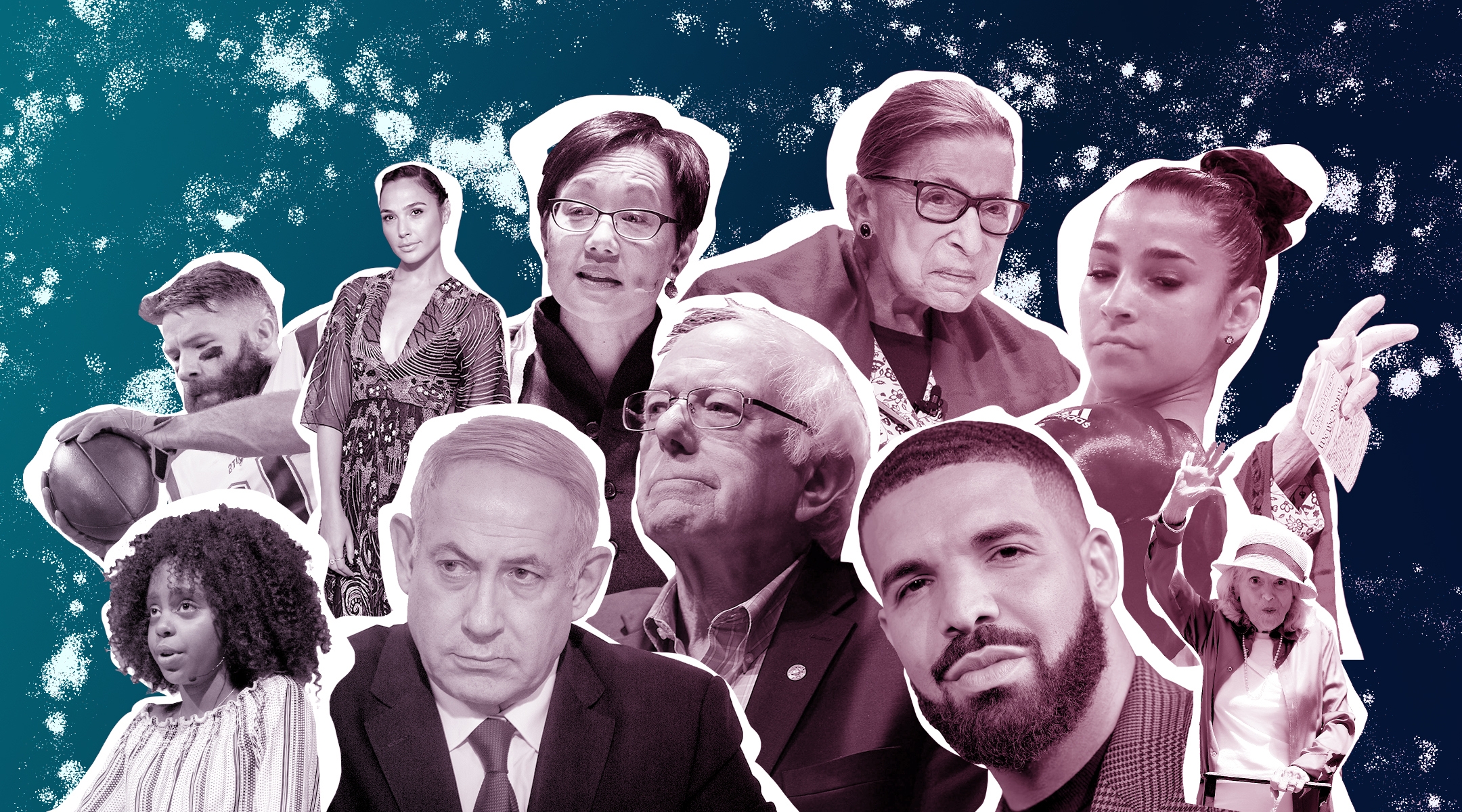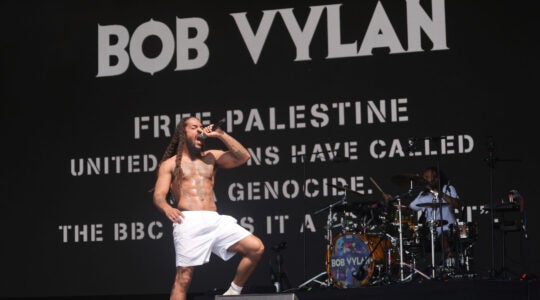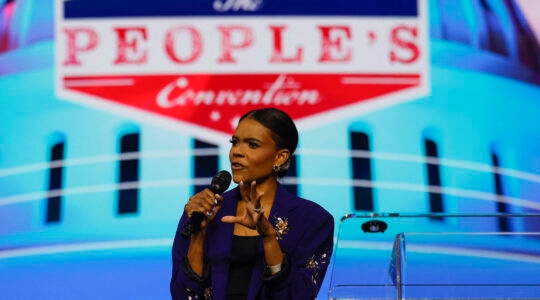(JTA) — The 2010s were nothing if not turbulent.
The decade brought us unprecedented political polarization, war and increasing conflict in Israel, dozens of horrific mass shootings, and a new age of election hacking and private data collection enabled by the proliferation of social media. It was capped by arguably the most shocking presidential election in American history.
These are the Jewish figures who steered us through it all, and who had the largest impact on life and culture in the last ten years.
Benjamin Netanyahu
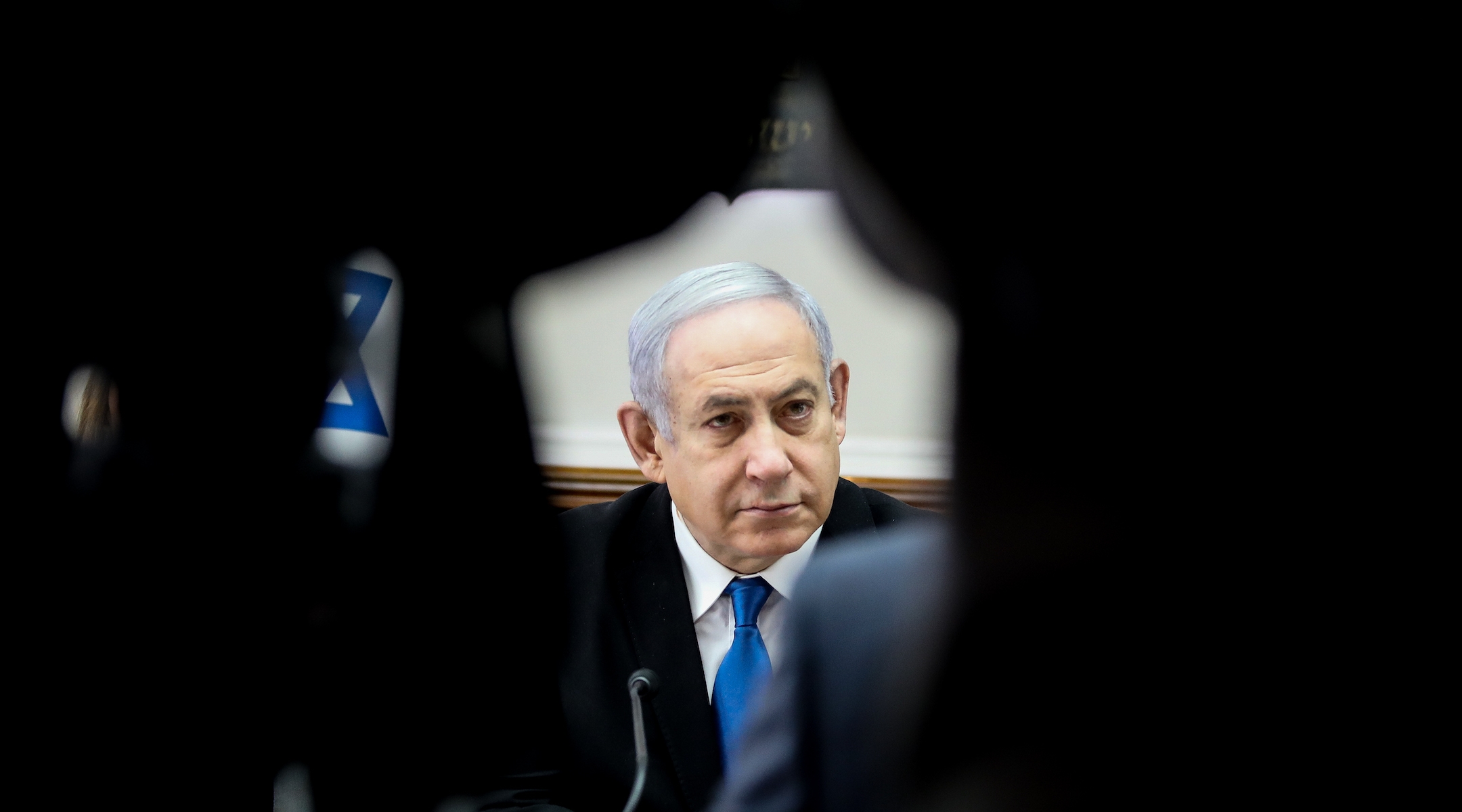
Israeli Prime Minister Benjamin Netanyahu leads the weekly Cabinet meeting at his office in Jerusalem, Dec. 1, 2019. (Marc Israel Sellem/Pool/Flash90)
Love him or hate him, no one person has dominated the Jewish 2010s more than the Israeli prime minister. He took office nine months before the decade began and, barring a drastic change, will still be in office when it ends.
Over the past ten years, Netanyahu has governed through two wars in Gaza, two fruitless rounds of negotiation with the Palestinians and two extremely different U.S. presidential administrations. Under his leadership, Israel’s economy has grown and the country has shifted right. Chances of a two-state deal — or any final agreement — with the Palestinians have become increasingly remote, but relations with other Arab states have started to thaw.
Bibi’s influence has stretched far beyond the borders of the Jewish state. He has aimed to marshal a global campaign against Iran’s nuclear program and cultivated strong relations with several key world leaders. His iciness toward President Obama and his bearhug of President Trump have put him at odds with most American Jews and have played a part in weakening a once-bipartisan consensus on supporting Israel. But the bromance with Trump has produced diplomatic gains, including the relocation of the U.S embassy to Jerusalem and formal U.S. recognition of Israeli sovereignty over the Golan Heights.
The decade has seen Netanyahu become Israel’s longest-serving prime minister. But he ends it under criminal indictment for fraud, bribery and breach of trust — and teetering on the brink of electoral defeat. In that sense, the tail end of the 2010s may be the most critical period for the man who defined the Jewish decade.
–Ben Sales
Bernie Sanders

Bernie Sanders speaks at a MoveOn.org rally in Reading, Penn., Dec. 3, 2017. He is credited with opening the door for other progressives to publicly criticize Israel. (Lisa Lake/Getty Images for MoveOn.org)
Before the 2010s, no one could have expected a septuagenarian Jewish socialist from Vermont would have a real shot at becoming president.
But Sanders made history in 2016 by becoming the first Jew to win major party state primaries, on his way to coming close to snagging the nomination. Whether or not he wins in his second attempt in 2020, Bernie Sanders’ two presidential runs have transformed political discourse in the Jewish community and the United States as a whole.
Because of Sanders, policies like single-payer health care, free public college and breaking up the big banks are now commonly discussed within the Democratic party. He has mobilized a wing of progressives across the country who want to abandon center-left liberalism in favor of his “political revolution.”
He has also sparked strong feelings across the Jewish community with the way he frames his Jewishness and his outspoken criticism of Israel — coupled with support for its existence. His criticism of Israel’s treatment of the Palestinians on a mainstream stage has emboldened other progressives to challenge assumptions about the decades-long U.S.-Israel relationship.
–Ben Sales
Jared Kushner and Ivanka Trump
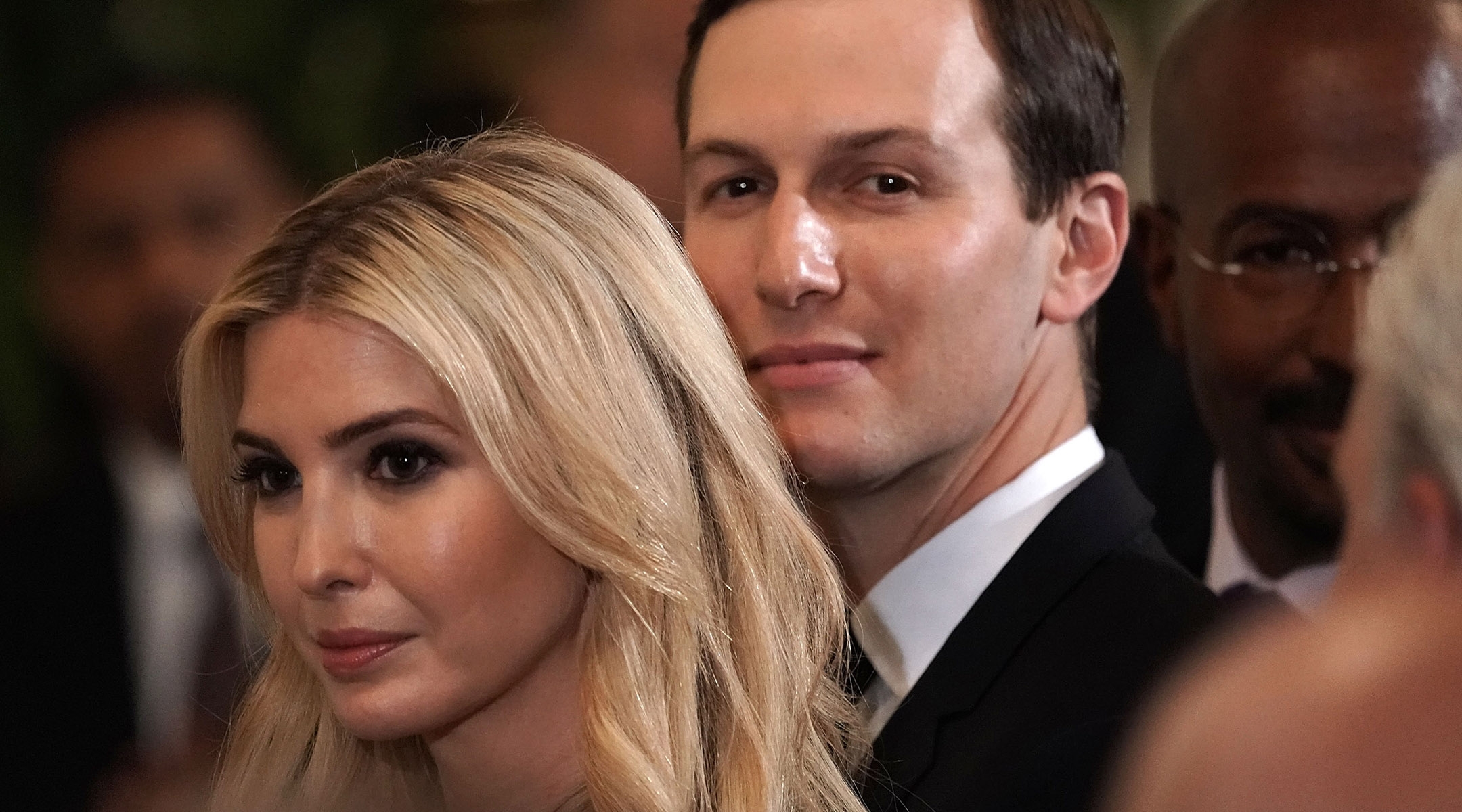
Ivanka Trump and Jared Kushner at a White House summit, May 18, 2018. (Alex Wong/Getty Images)
Jews have long served in trusted White House positions, but never have two Jews been so close to the president. As President Trump’s senior advisers, and his daughter and son-in-law, Ivanka and Jared have the president’s ear in a new and unpredictable era of American government.
Trump invested both sides of “Javanka” with tremendous responsibility. Ivanka has become a presence at high-level diplomatic events. Jared was given a vast portfolio — from the opioid crisis to Israeli-Palestinian negotiations. He has had a tangible impact in the Jewish state, where he has advocated moving the U.S. embassy to Jerusalem and withdrawing funding from Palestinian institutions.
Liberal Jews hoped Ivanka and Jared, as two young Jews from New York City, would be a check on some of the president’s hardline policies. Jewish conservatives saw the Orthodox couple — and Trump’s trust in them — as a rebuttal of the idea that the president condoned anti-Semitism. And when the administration began, their Jewish practice was scrutinized, something that has subsided as Jews have gotten used to the couple’s unique role in the White House.
–Ben Sales
Drake
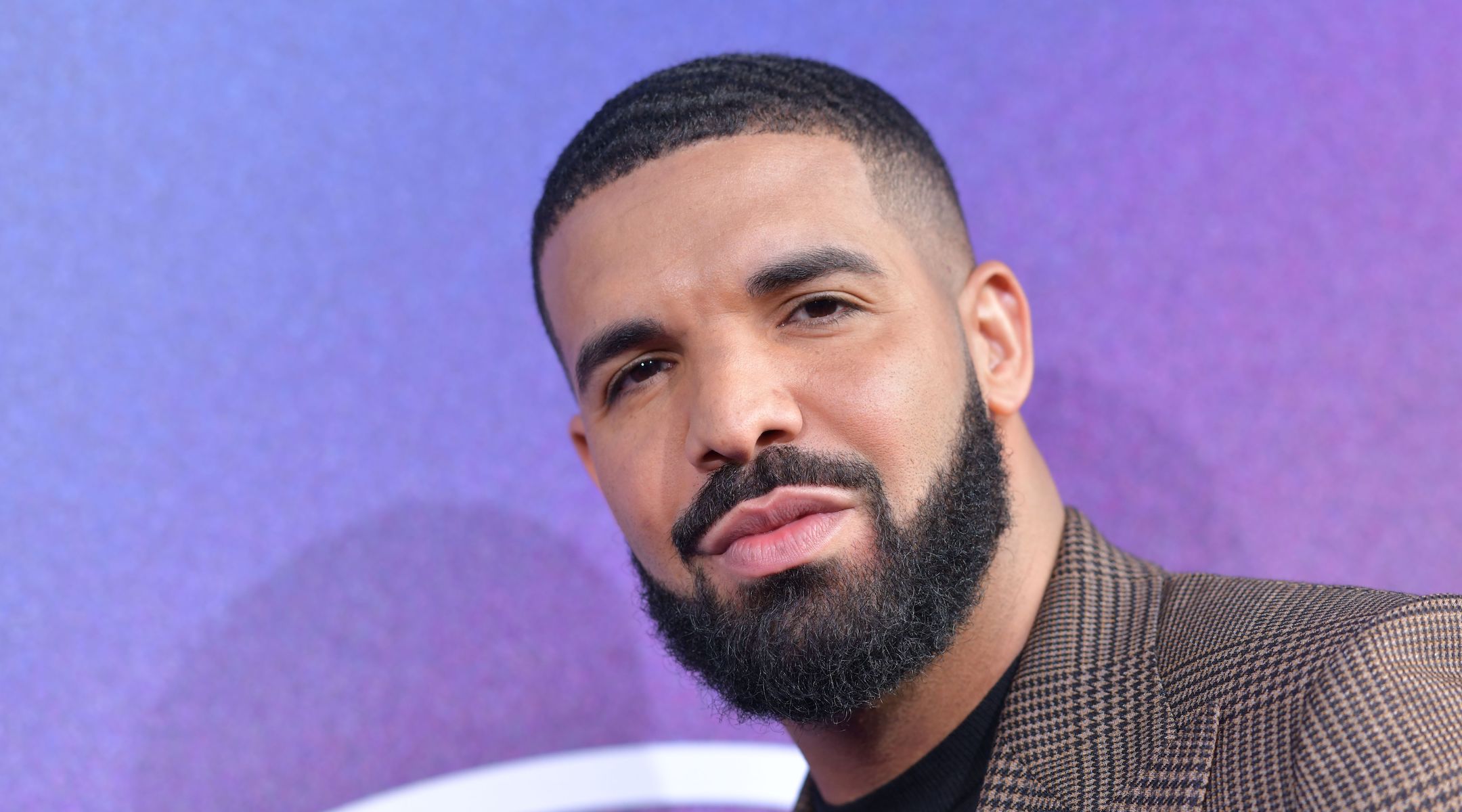
Drake at the Los Angeles premiere of the HBO series “Euphoria,” June 4, 2019. (Chris Delmas/AFP via Getty Images)
Thanks to some tabloid-level drama over the past few years, many bristle at statements about Drake’s influence on the music industry. But it’s hard to argue with the numbers.
The rapper and singer (and former teen actor), born Aubrey Graham to an African-American father and Jewish mother, was the most streamed musician of the decade. He broke multiple Billboard chart and Spotify records. He became the best-selling digital singles artist of all time.
His legacy continues to play out through the countless contemporary artists who mimic his smooth sonic style and his combination of rapping and singing.
Though he rarely gives interviews, Drake has shown some Jewish pride a few times — perhaps most notably during a 2014 “Saturday Night Live” skit about his bar mitzvah, and a second bar mitzvah party of sorts in 2017. He attended a Jewish day school in his native Toronto as a kid.
–Gabe Friedman
Ruth Bader Ginsburg
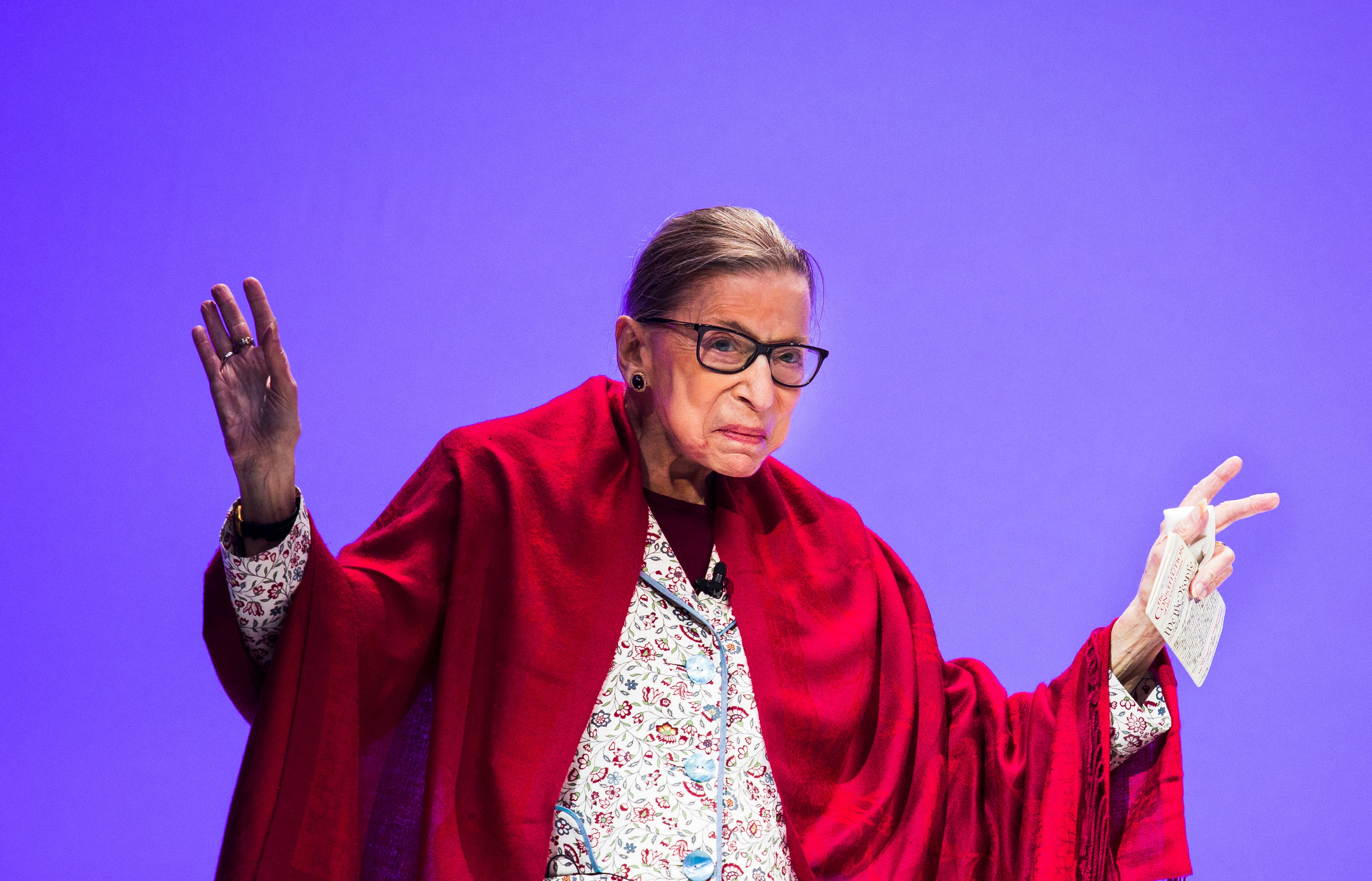
Ruth Bader Ginsburg at Amherst College in Amherst, Mass., Oct. 3, 2019. (Erin Clark for The Boston Globe via Getty Images)
This decade saw Ruth Bader Ginsburg go from outspoken liberal Supreme Court justice to the Notorious RBG — one of the zeitgeist’s foremost political and pop culture icons.
The story starts with the Jewish justice’s resilience in her career and personal life, having fought for gender equality for decades — through a series of crucial Supreme Court cases and other projects — and battling multiple bouts of cancer.
In 2013, inspired by this and more specifically by Ginsburg’s dissent in a case involving voting rights, New York University law student Shana Knizhnik started a blog that compared Ginsburg to the late rapper the Notorious B.I.G. Multiple documentaries, books and a feature film starring Felicity Jones later, the nickname has stuck. There are RBG action figures. A U.S. women’s national team soccer player put her name on her jersey once. Even her workout routine became an online phenomenon.
By the end of the 2010s, Ginsburg experienced some more health scares that jeopardized the future of the court — but she quickly bounced back every time, true to her well-earned identity as a badass.
–Laura Adkins
Mark Zuckerberg
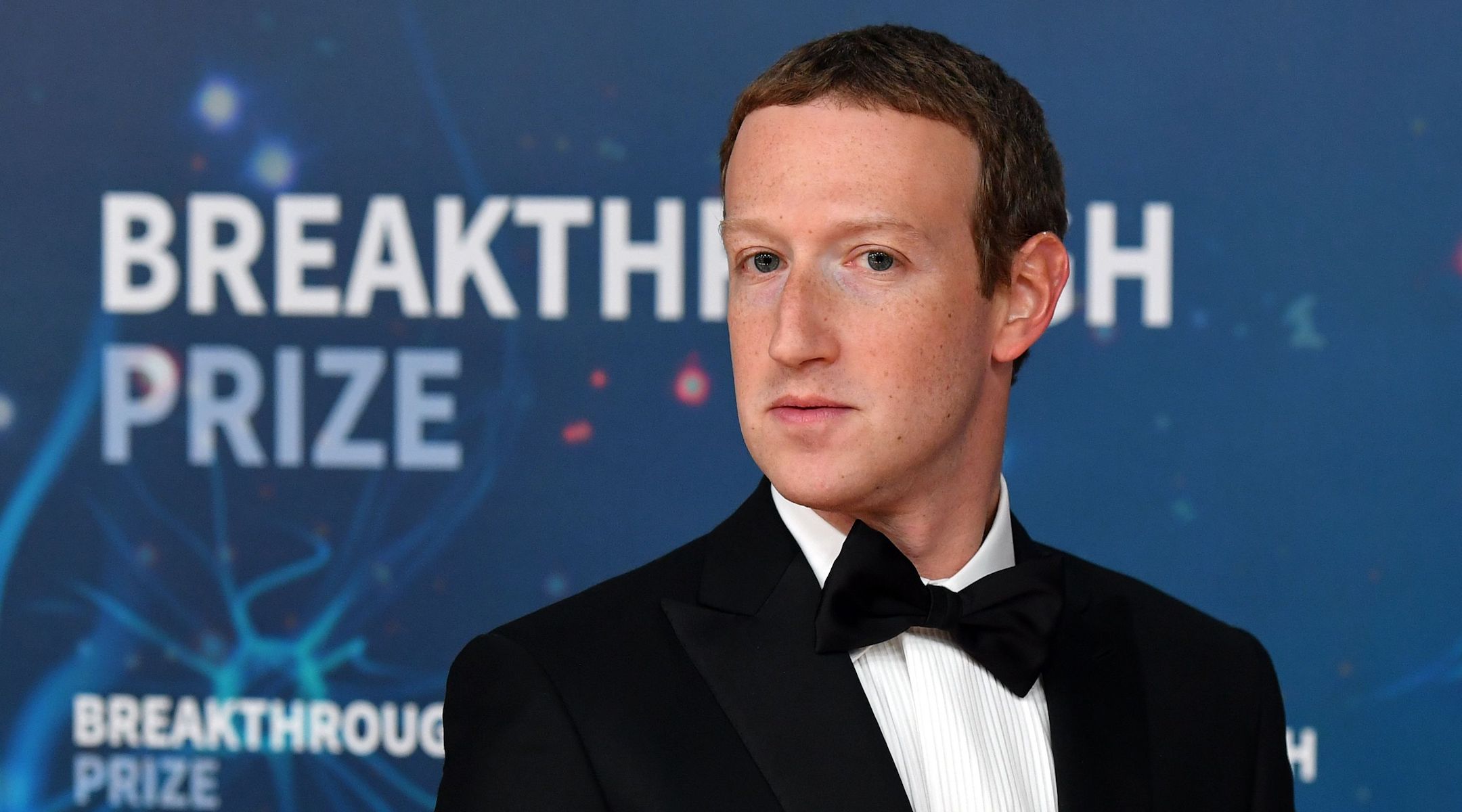
Mark Zuckerberg at the Breakthrough Prize awards ceremony at NASA’s Ames Research Center in Mountain View, Calif., Nov. 3, 2019. (Josh Edelson/AFP via Getty Images)
Few people have had as large an impact on the way we live and communicate over the past decade as Facebook founder Mark Zuckerberg. As the 2010s draw to a close, the company founded in Zuckerberg’s Harvard dorm room in 2004 boasts nearly 2.5 billion users — or roughly one out every three people on the planet — and its influence reaches into countless corners of our lives.
The 2010s were a period of meteoric growth for the company, which is now ranked among the ten most valuable public corporations in the world. But perhaps inevitably, the 2010s also saw Facebook coming under increasing scrutiny — and mounting criticism.
The company stands accused of misusing oceans of personal user data, addicting people to their phones, obliterating the capacity for sustained attention, undermining democracy, fomenting ethnic violence and inciting hatred — and that list is hardly exhaustive. Much of this came to a head in the wake of the 2016 U.S. presidential election, when American intelligence officials said Russia manipulated Facebook as part of its effort to swing the election to Donald Trump.
Zuckerberg has occasionally tried to contain the damage, as in 2017, when he posted a Yom Kippur message asking forgiveness for any divisiveness he had caused. But after enduring a sustained lashing from members of the House Financial Services Committee in October, Zuckerberg acknowledged that he might not be the best person to present Facebook’s case to the world.
“I get that I’m not the ideal messenger for this right now,” he said. “We certainly have work to do to build trust.”
–Ben Harris
Gal Gadot
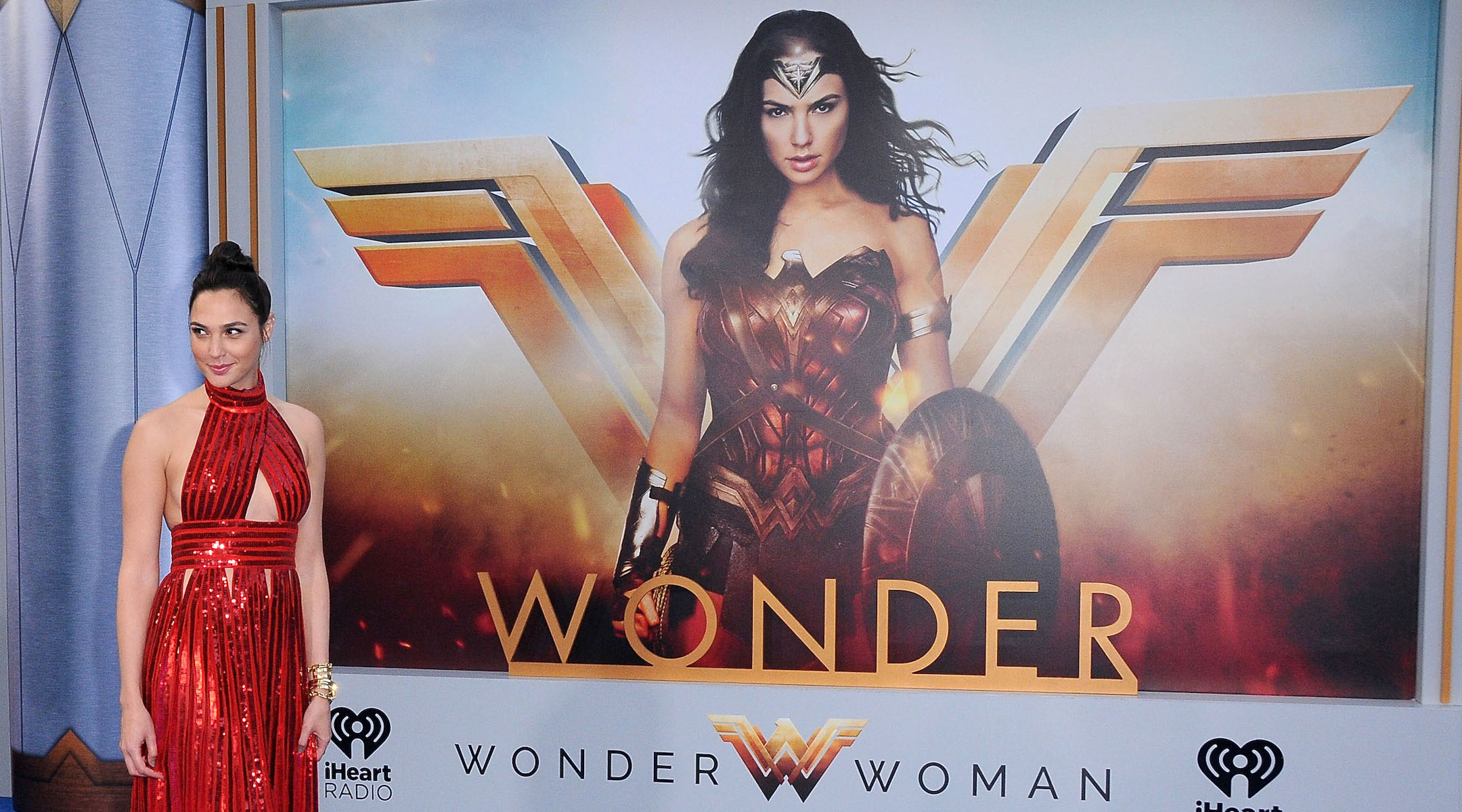
Gal Gadot at the “Wonder Woman” premiere in Hollywood, Calif., May 25, 2017. (Barry King/Getty Images)
Before 2017, Gal Gadot was best known as a supermodel who showed up in multiple movies in the “Fast and Furious” franchise. She was also a former Miss Israel, and before that an Israel Defense Forces combat readiness instructor.
These days, she’s Wonder Woman.
Her role in the 2017 DC Comics film named after the legendary superhero skyrocketed her to international fame and transformed her into an icon of inspiration for women and girls around the world. The character has been hailed as a long overdue feminist addition to the comic book movie canon, and the film’s overwhelming box office success proved that a female-fronted superhero flick could sell just as well, or better, than ones starring men.
Gadot, now 34, has an esteemed Jewish yichus — her maternal grandfather is an Auschwitz survivor and her father is a sixth-generation Israeli. She has two young daughters with her husband, Israeli real-estate developer Yaron Varsano. Gadot and Varsano are in the process of remaking an Israeli crime drama for English-speaking audiences, as well as a novel about an Israeli-Palestinian romance that was banned in Israeli schools.
–Laura Adkins
Michael Bloomberg
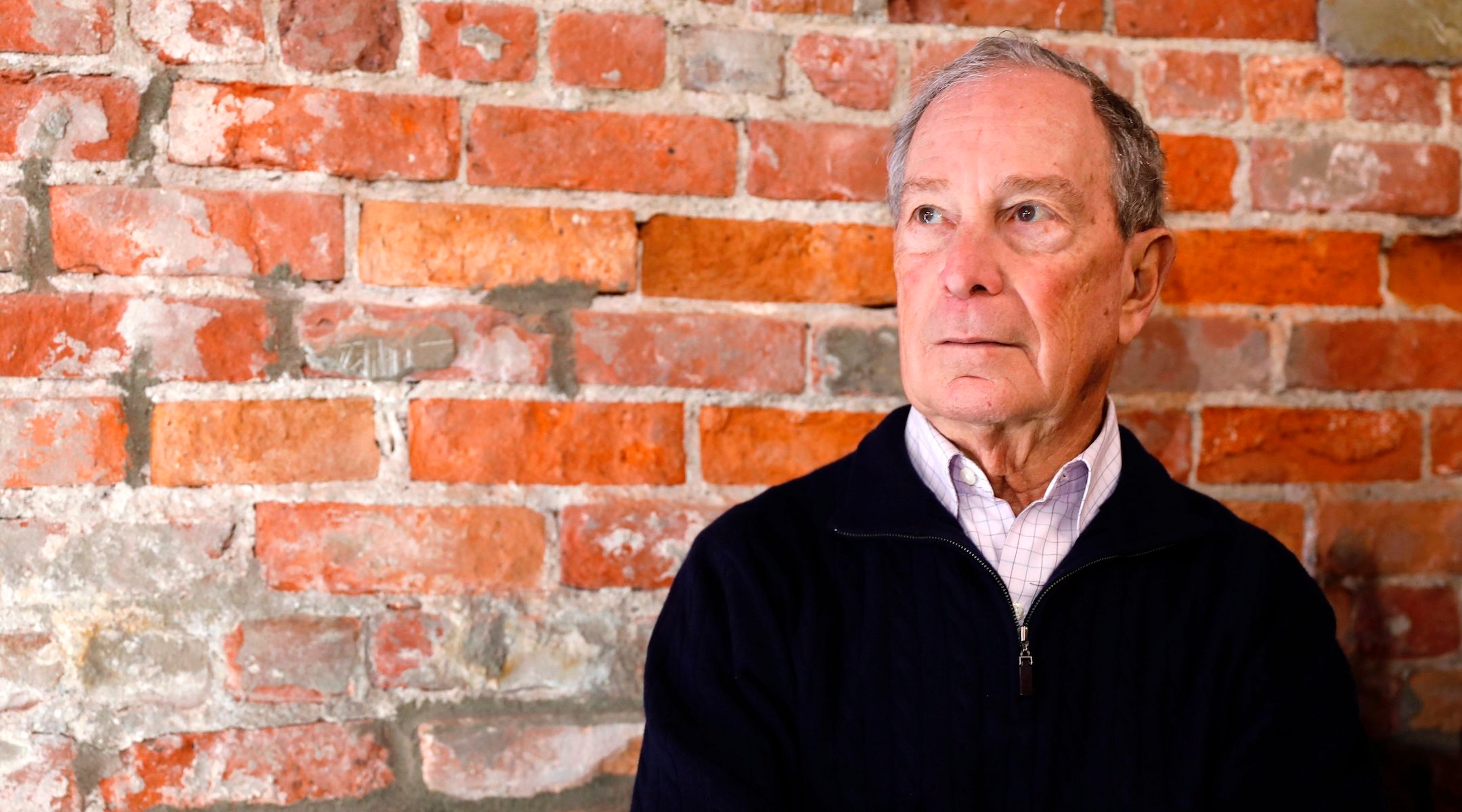
Michael Bloomberg poses at a presidential campaign event in Detroit, Dec. 21, 2019. (Jeff Kowalsky/AFP via Getty Images)
If Michael Bloomberg has his way, he’ll start the next decade as the first Jewish president of the United States. But it’s easy to forget how influential the billionaire has already been over the past ten years.
After his transformational tenure as mayor of New York — during which he left almost no big issue untouched, from crime to tourism to arts initiatives — Bloomberg moved on to national and global issues. He has funneled tens of millions (out of his net worth of around $56 billion) to gun control initiatives, including his own Everytown for Gun Safety group. He has also become a leading voice on combating climate change, putting a portion of his fortune towards research and lobbying on the issue and insisting that American cities can still help the country decrease harmful emissions even while it’s led by a president who does not believe in global warming.
And after flirting with the idea for years, Bloomberg finally went all in on a presidential candidacy at the end of 2019, believing that his centrist, get-things-done reputation would appeal to voters disheartened by Trump and unenthused by the slew of Democratic candidates.
–Gabe Friedman
Abbi Jacobson and Ilana Glazer
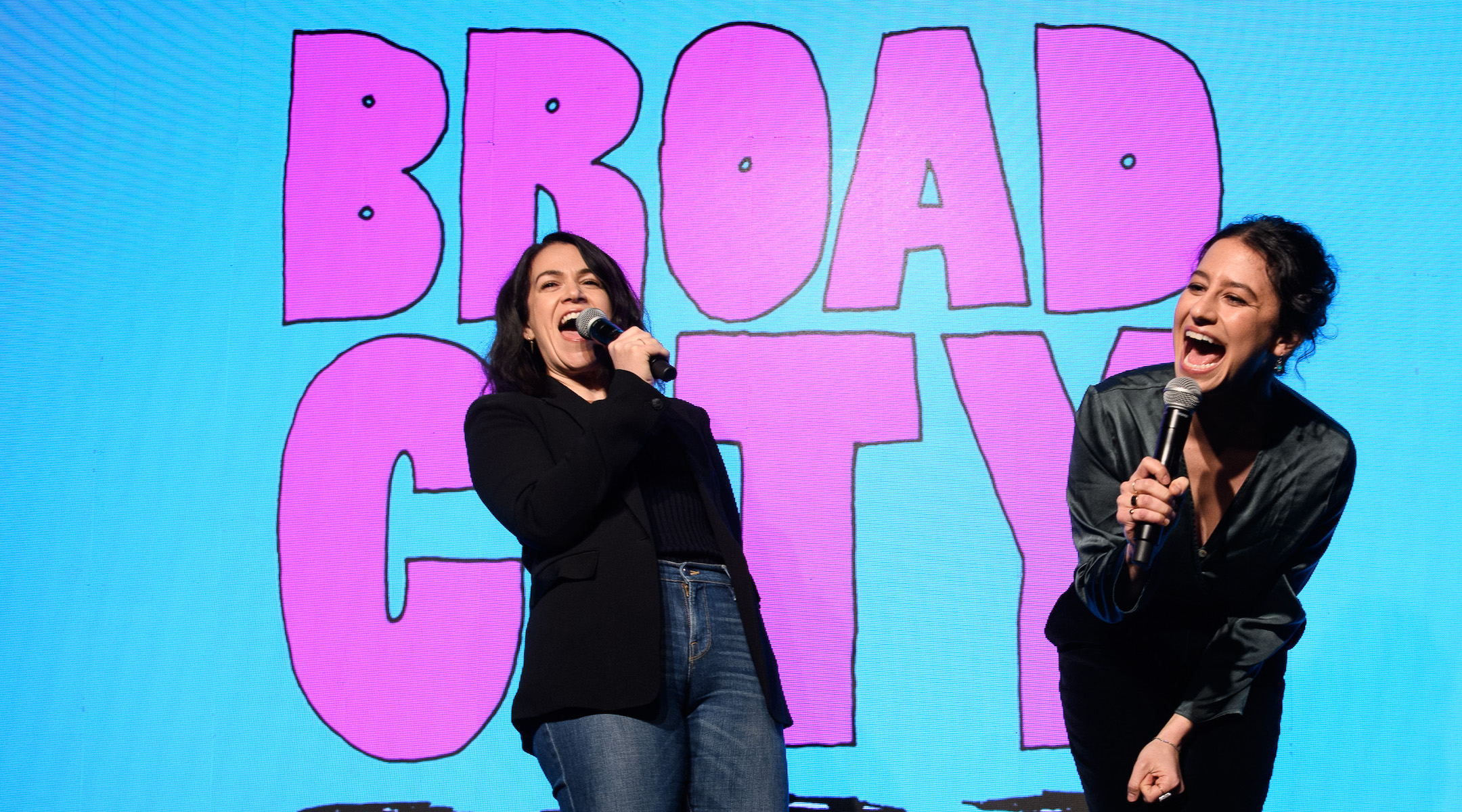
Abbi Jacobson, left, and Ilana Glazer at an event for their series “Broad City” at Sony Hall in New York City, March 27, 2019. (Dave Kotinsky/Getty Images for Comedy Central)
Jewy shtick had long been part of the backbone of American comedy — but never like this.
Abbi Jacobson and Ilana Glazer’s Comedy Central sitcom “Broad City,” a wacky encapsulation of New York millennial life that aired from 2014 to 2019, fused Jewishness and humor in an original way en route to becoming one of the most beloved shows of the decade.
Jacobson and Glazer’s characters — two stoners, loosely based on themselves, who constantly find themselves in ridiculous situations — owned their Jewishness in a confident way that nebbishy icons of the past, like Woody Allen or Jerry Seinfeld, did not. They also helped redefine the popular image of Jewish women.
As Elana Spivack put it in Alma earlier this year, Jacobson and Glazer took us “from shpilkes to chutzpah.”
They didn’t shy from directly discussing their Jewish identities on the show either. One episode harshly mocked Birthright. Another took aim at some of the racist Jews of Florida. In another, the girls hang out with a Holocaust survivor. That’s on top of countless Jewish-themed jokes and references that helped usher in what some have called the most Jewish era of mainstream television in modern memory.
–Gabe Friedman
Edith Windsor
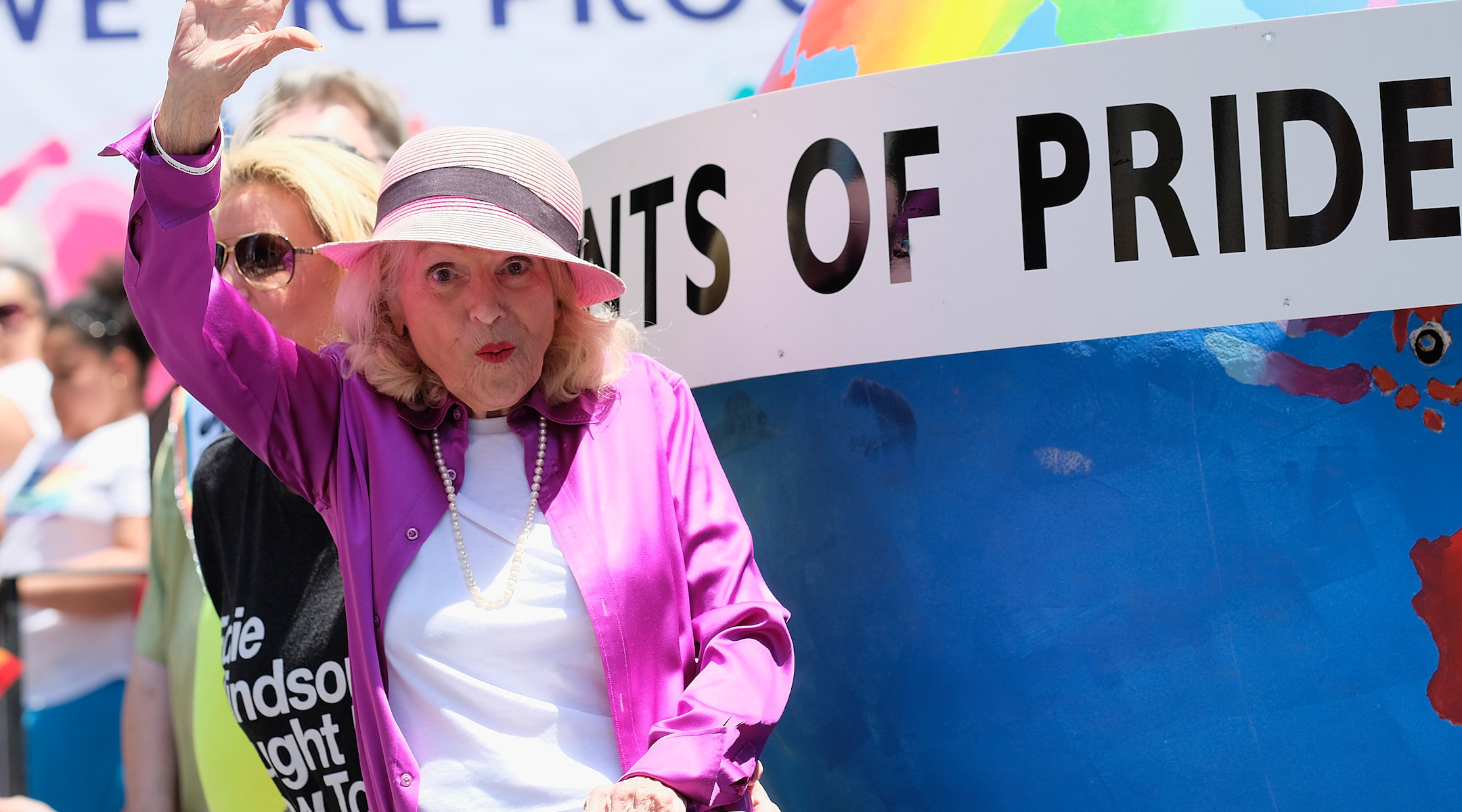
Edith Windsor at the New York City Gay Pride Parade, June 25, 2017. (Dimitrios Kambouris/Getty Images)
Edith Windsor was active in the LGBTQ rights movement since its beginning in the late 1960s. But it was her 2009 case that cemented her stature as one of its most impactful activists.
That year, Windsor was denied a spousal exemption and forced to pay federal taxes on the estate of her late wife, Thea Spyer, even though their Canadian marriage was recognized as legal by the State of New York, where they resided.
Windsor, who worked as a computer programmer, pursued her case all the way to the Supreme Court. Four years after her wife’s death, the court ruled to overturn Section 3 of the Defense of Marriage Act. The 2013 ruling was considered a landmark victory for same-sex couples and meant that the federal government must abide by the laws of individual states in its dealings with couples from those states.
After her win, Windsor attended services at her Manhattan synagogue, Congregation Beit Simchat Torah, which was founded to serve the gay community. Her lawyer, Roberta Kaplan, delivered a sermon about the win. Windsor later remarried.
Her death in 2017 was mourned by LGBTQ activists around the world and their allies, including President Barack Obama.
–Josefin Dolsten
Andrew Pollack and Fred Guttenberg
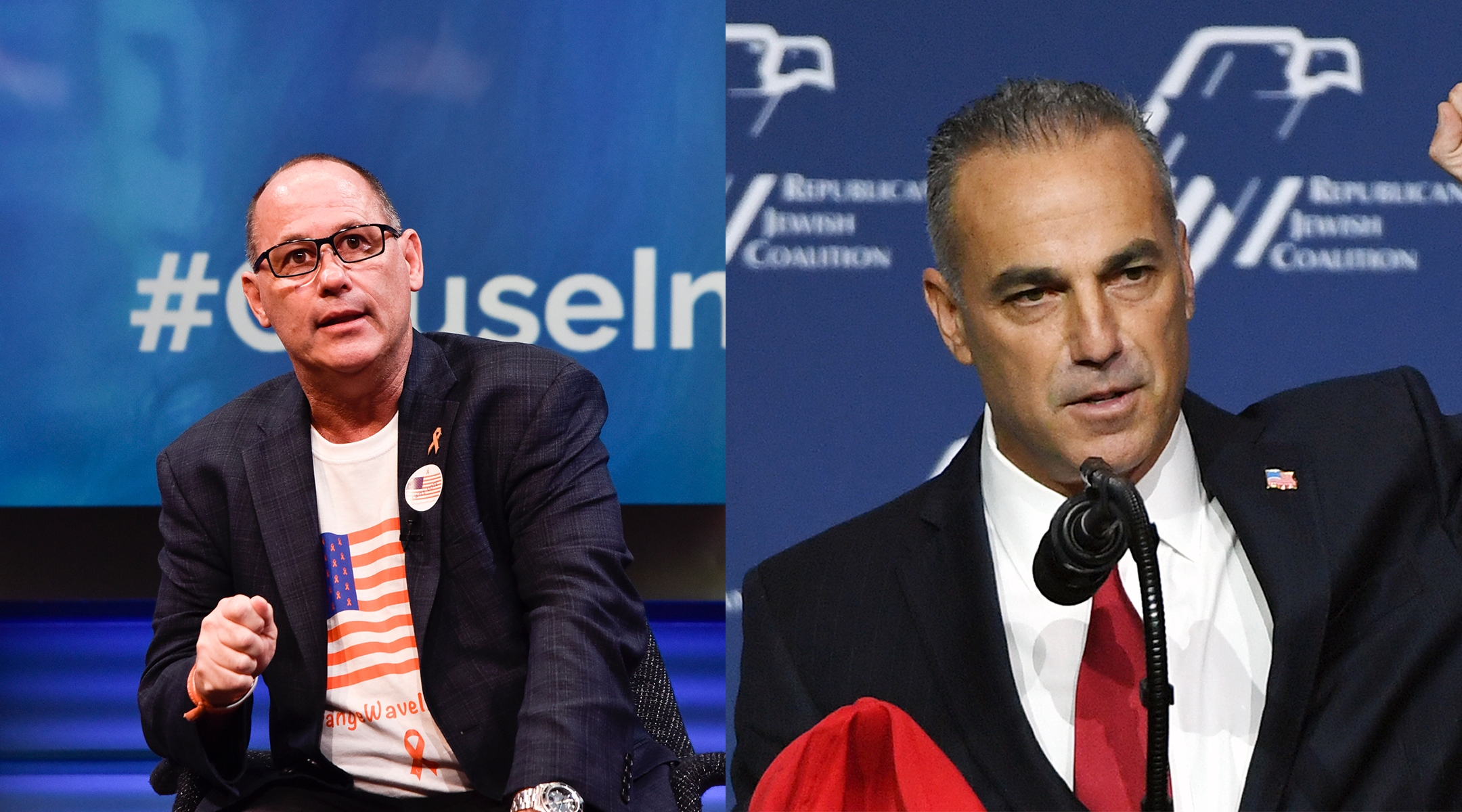
Fred Guttenberg, left, at the National Geographic Society in Washington, D.C., and Andrew Pollack at the Republican Jewish Coalition conference in Las Vegas. (Getty Images)
Fred Guttenberg and Andrew Pollack’s lives were both torn apart on Feb. 14, 2018, when a former student entered Marjory Stoneman Douglas High School in Parkland, Florida, and opened fire. Guttenberg’s daughter, Jaime, and Pollack’s daughter, Meadow, were among the 17 victims.
The men share many similarities: they are both 53 years old, Jewish, and not particularly involved in politics prior to the shooting. But the massacre led both to dedicate their lives to activism to honor their daughters’ memories and prevent similar deaths. Both now have more than 100,00 followers on social media and have met with prominent lawmakers.
But the two fall on complete opposite sides of gun control debate: while Guttenberg has become a progressive advocate for gun reform, Pollack is an outspoken supporter of President Donald Trump, who has said people are too quick to blame guns for mass killings.
The two men’s heart-wrenching stories have inspired many on both sides, and the different paths their shared tragedy led has them down resonate especially deeply at a time of deep political polarization, when national tragedies seem only to further entrench those differences.
–Josefin Dolsten
Angela Buchdahl
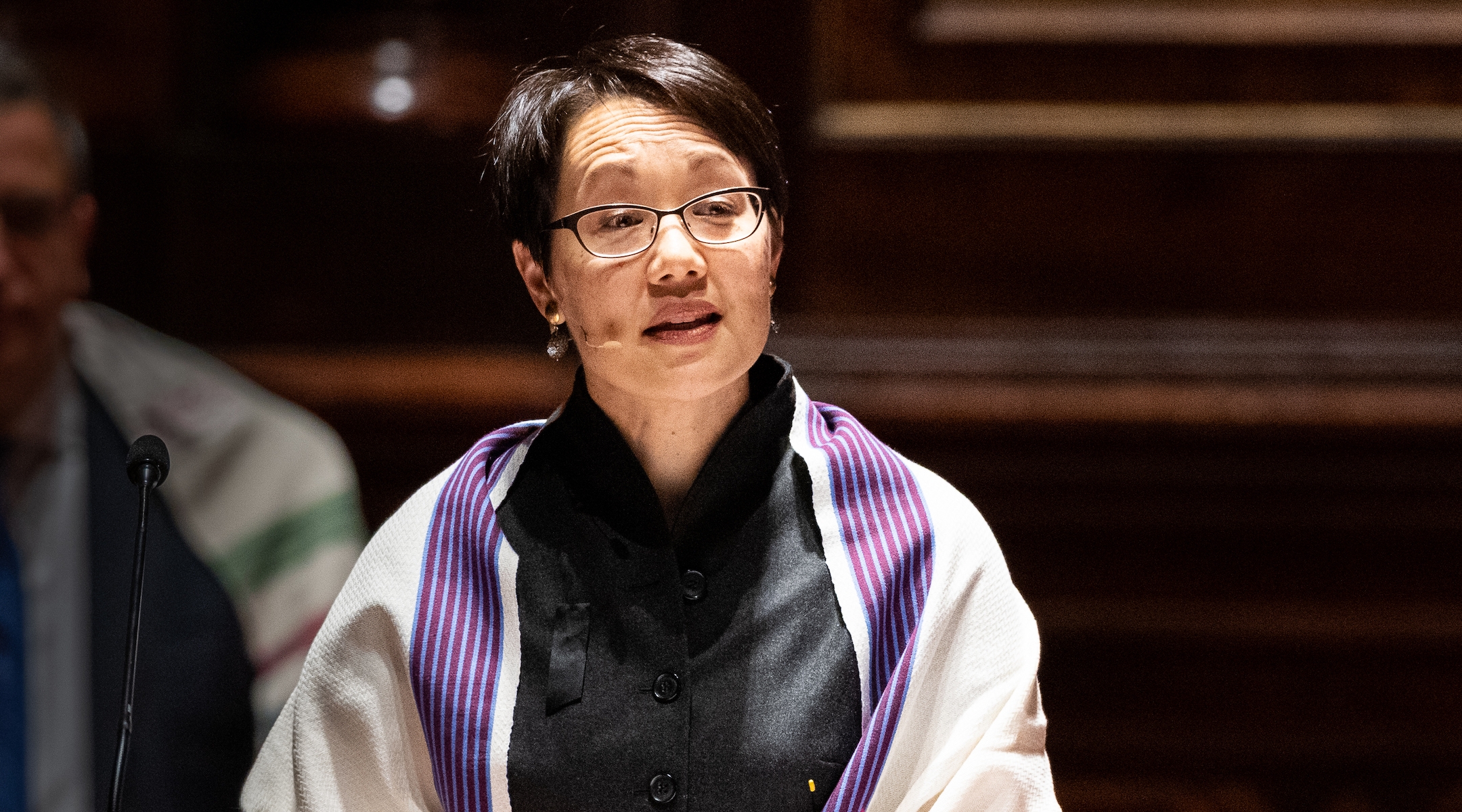
Rabbi Angela Buchdahl speaking at an interfaith prayer vigil on Oct. 30, 2018, at the Central Synagogue in New York City for victims of the Tree of Life Synagogue shooting. (Michael Brochstein/SOPA Images/LightRocket via Getty Images)
Angela Buchdahl’s ordination as the first Asian American rabbi in 2001, and the first woman overall to become both a cantor and a rabbi, was a watershed moment for American Jews. But it was Buchdahl’s selection in 2014 as senior rabbi of New York’s Central Synagogue, among the largest Jewish houses of worship in the country, that really marked her arrival on the global Jewish scene.
The choice of Buchdahl to replace the retiring Rabbi Peter Rubinstein elevated a woman and a Jew of color to a position of virtually unprecedented prominence in the Jewish world and made Buchdahl a potent symbol of the changing face of American Judaism.
Born in Korea and raised in Washington state by a Buddhist mother and Jewish-American father, Buchdahl spoke at the White House Hanukkah party in 2014, noting how incredulous the American founding fathers likely would have been at the sight of an Asian-American rabbi praying alongside the first African-American president. In 2018, she made headlines again when she banned for a year the music of Shlomo Carlebach, the prolific composer who had been accused by multiple women of sexually inappropriate acts.
–Ben Harris
Michael Solomonov
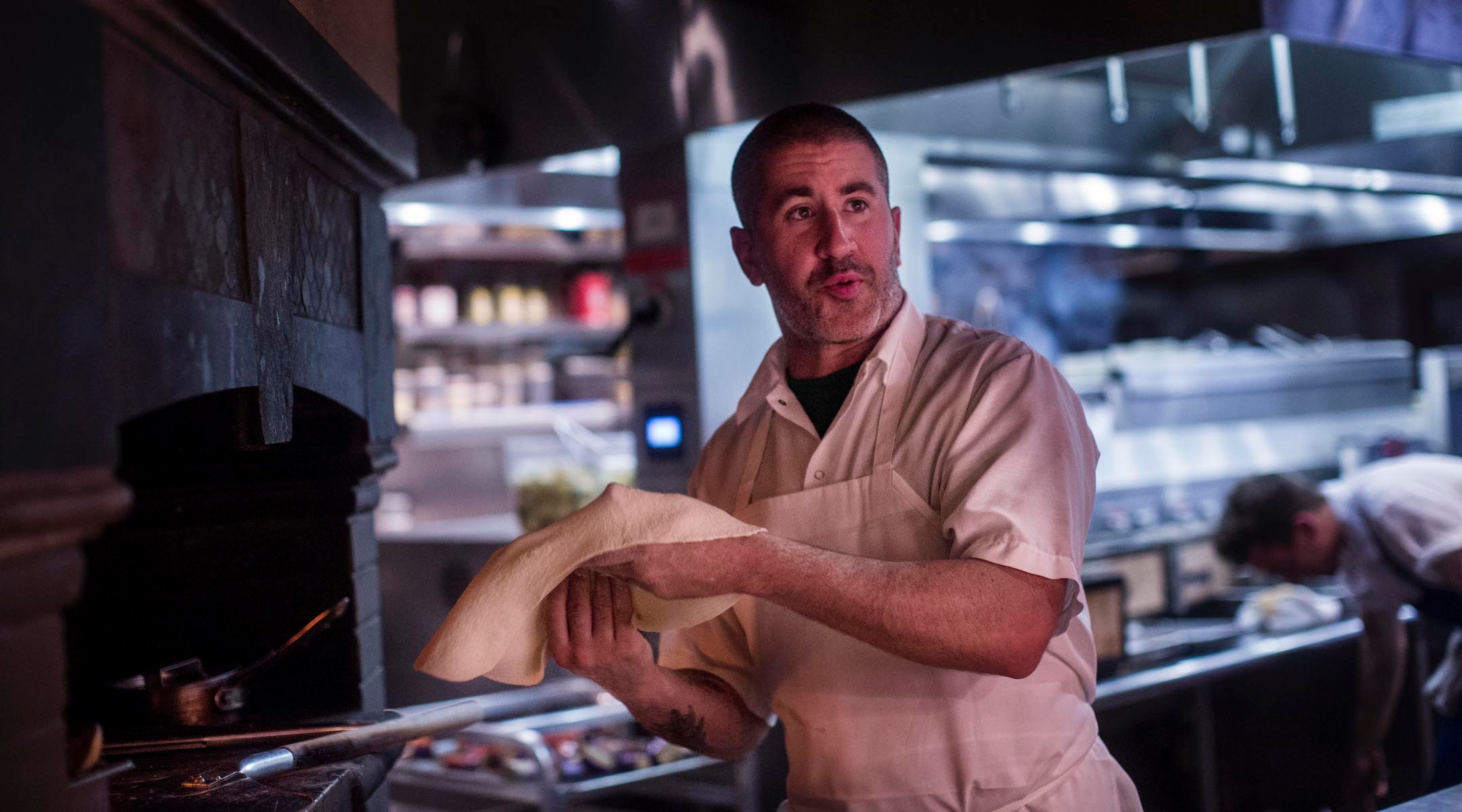
Michael Solomonov working the oven at his restaurant Zahav in Philadelphia, July 14, 2015. (Melina Mara/The Washington Post via Getty Images)
Ten years ago, you may have never heard of ingredients like tahini, harissa, labne, halloumi and preserved lemon. Today, you can easily find these and more Israeli staples at your local supermarket (or Trader Joe’s). You can also stumble upon them on trendy restaurant menus in just about every city, from San Francisco to Boston.
The hunger for ingredients like these and Israeli food more broadly can be credited in large part to the food gospel of chef Michael Solomonov and his business partner Steve Cook.
Solmonov boasts four James Beard awards, two best-selling cookbooks and more than eight restaurants to his name, including the renowned Zahav and the popular Dizengoff hummus restaurant in Philadelphia. Intentionally or not, he has brought a passion for Israeli cuisine to the masses of North America. He believes that food belongs to everyone, and has sought to bring the Israeli tradition of ripping, tearing, dipping and sharing to more and more willing eaters. He steers clear of politics, but doesn’t shy away from showcasing the diverse food traditions that define Israeli cuisine.
Born in Israel but raised in Pittsburgh, Solomonov has fundamentally changed the way Americans eat, impacted the way we define Israeli food and influenced the way Jews, and non-Jews, view Jewish food today.
He is launching a culinary school in Israel and will open yet another restaurant in 2020.
–Shannon Sarna
Volodymyr Zelensky
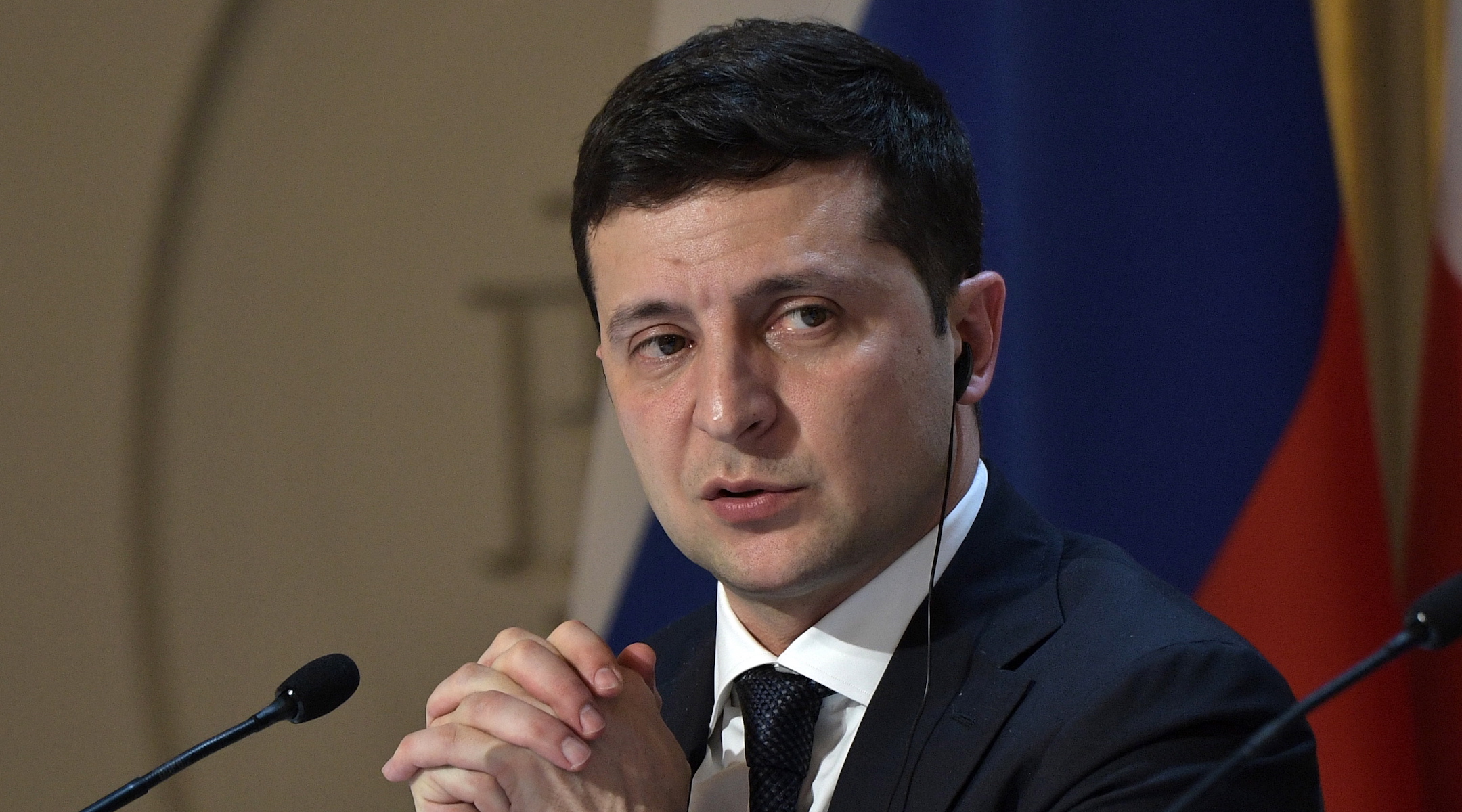
Ukrainian President Volodymyr Zelensky gives a news conference at the Elysee Palace in Paris, Dec. 9, 2019. (Alexei Nikolsky/TASS via Getty Images)
Last December, Volodymyr Zelensky was a television actor in Ukraine most famous for portraying a school teacher who through an unlikely series of events gets elected president.
But on New Year’s Eve, Zelensky’s life began imitating his art: The Jewish comedian announced that night that he was running for president. He won the national election in a landslide less than four months later.
Just months after that, Zelensky found himself at the center of President Donald Trump’s impeachment scandal. Zelensky was the world leader on the phone call with Trump that is at the heart of Democrats’ case against the U.S. president. Trump is accused of pressuring Zelensky on the call to dig up dirt on Joe Biden’s son Hunter in exchange for U.S. foreign aid money.
Back home, Zelensky’s victory was a remarkable outcome in a country whose soil has for centuries been drenched with Jewish blood. Following the confrontational and nationalist politics of Zelensky’s predecessor, his election gave hope to pragmatists seeking to rebuild Ukraine’s ruined economy and normalize relations with its aggressive neighbor, Russia.
It’s all quite a lot to ask of a political newcomer, and some worry that Zelensky’s failure to deliver could make Ukraine’s Jewish community a scapegoat.
–Cnaan Liphshiz
Aly Raisman
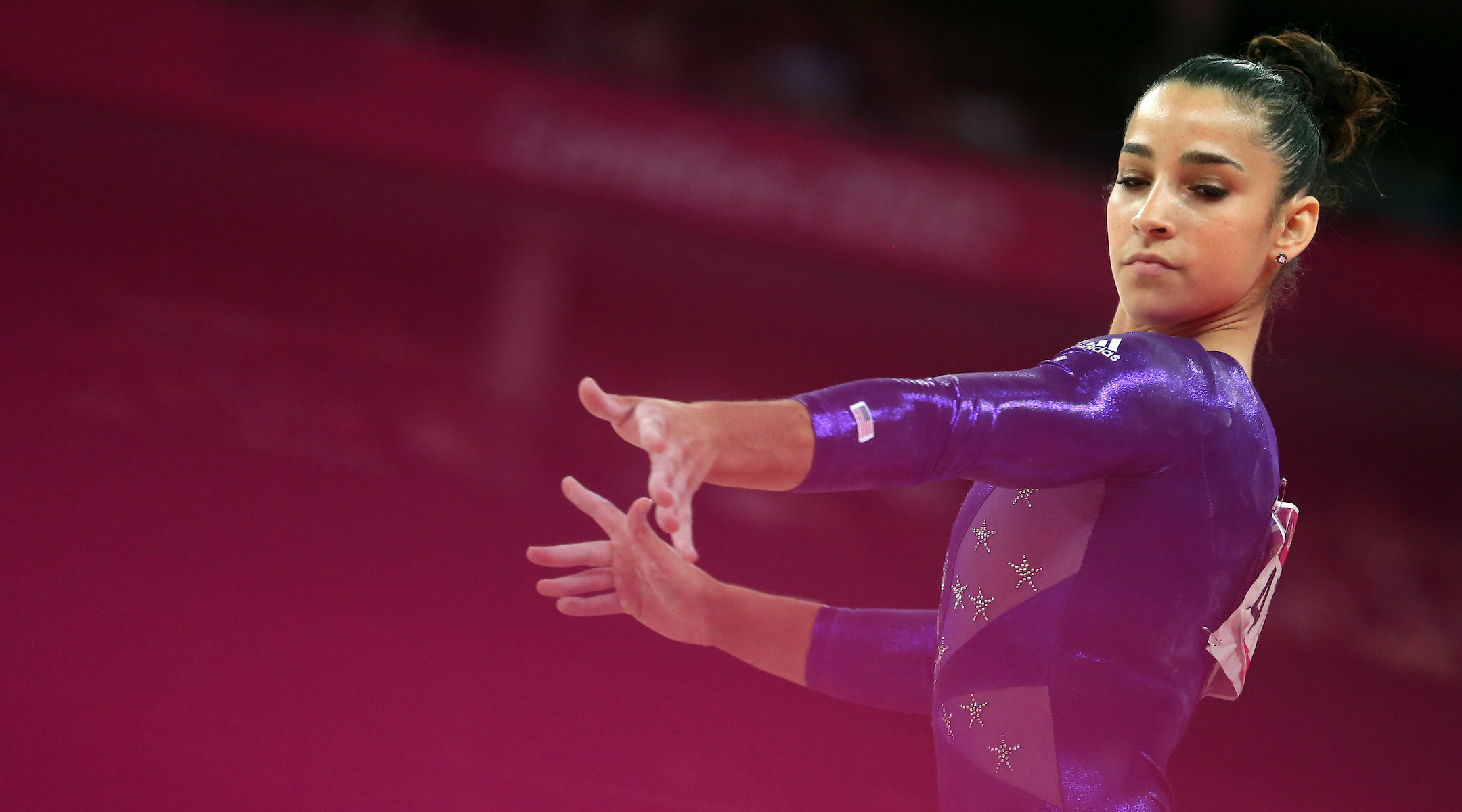
Aly Raisman performs in the artistic gymnastics qualification round at the London Olympics, July 29, 2012. (Ronald Martinez/Getty Images)
Aly Raisman spent a little over half the decade becoming and staying an Olympic gold medalist. She spent the latter part of it becoming an influential advocate for sexual abuse victims and an empowered role model for women everywhere.
At the 2012 Olympics in London, Raisman was the most decorated American gymnast, winning gold in the floor and team categories while performing a routine to “Hava Nagila” on the way. At the 2016 games in Rio de Janeiro, she won silver in two individual categories and gold again with the team.
Raisman would later be a leading voice in the trial of her abusive former coach, Larry Nassar. Her statement in court about turning the tables put powerful men on notice.
In a 2018 BBYO speech, Raisman told Jewish teens about the importance of family and Jewish values to her work, and that she sees herself as representing the Jewish community when she performs. She started gymnastics at age 2 and vows to return for the 2020 Olympics.
–Laura Adkins
David Friedman
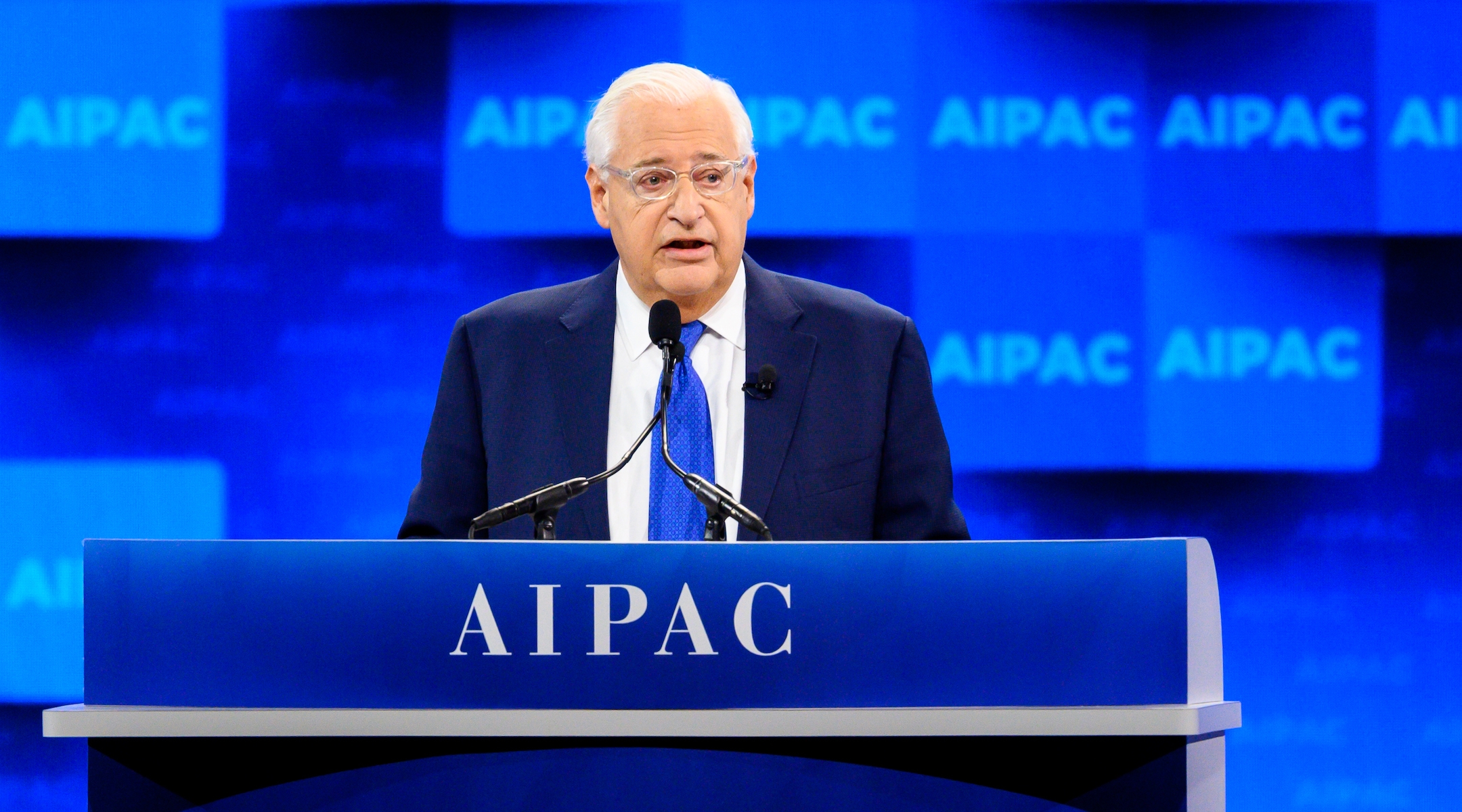
U.S. Ambassador to Israel David Friedman seen speaking during the American Israel Public Affairs Committee policy conference in Washington, D.C., March 26, 2019. (Michael Brochstein/SOPA Images/LightRocket via Getty Images)
When President Donald Trump named the team he hoped would bring about peace in the Middle East, David Friedman seemed like a junior member. Unlike Jason Greenblatt and Dina Powell, he wasn’t a full-time peace seeker — he had a day job as ambassador to Israel. Unlike Jared Kushner, he was not Trump’s son-in-law.
For a time, it looked like Greenblatt was taking the lead: showing up in Jewish settlements and Palestinian towns, walking the border with the Gaza Strip. Friedman was posting goofy videos of himself making last minute Jewish holiday purchases.
But by the end of 2017, it had become clear that David Friedman was in charge, and that he exerted more influence on Trump when it came to Israel issues than any other person in his inner circle.
Trump recognized Jerusalem as Israel’s capital, an act that drove Palestinians, initially flattered by the attention they received from Kushner and Greenblatt, out of the peace process. Insiders said Friedman, who flew to Washington to meet Trump with unusual frequency, had driven the decision.
In retrospect, it shouldn’t have been a surprise. Of the four, Friedman had always been the bomb-thrower, with ties to more extreme precincts of the Israeli settler movement. He was the one targeting liberal Jewish groups long before Trump ran for president, calling J Street “worse than kapos.”
Among non-family members, Friedman had one of the closest relationships with Trump, who once traveled through a snowstorm to sit shiva with Friedman after his father died. It was an intimacy that extended into their professional relationship. Trump said recently that he wished Friedman would go back to calling him “Donald.” Friedman insists on “Mr. President.”
In the same speech, to the Israeli American Council, Trump described how the historic U.S. recognition of the Golan Heights as sovereign Israeli territory came about.
“I said to David, ‘David, tell me about the Golan Heights in 30 seconds or less.’ He said, ‘It’s high. It’s important. It’s sovereign. It’s security.’ And I said, ‘What do you think, David?’ He said, ‘I think you could do it.’”
–Ron Kampeas
Luciana Berger
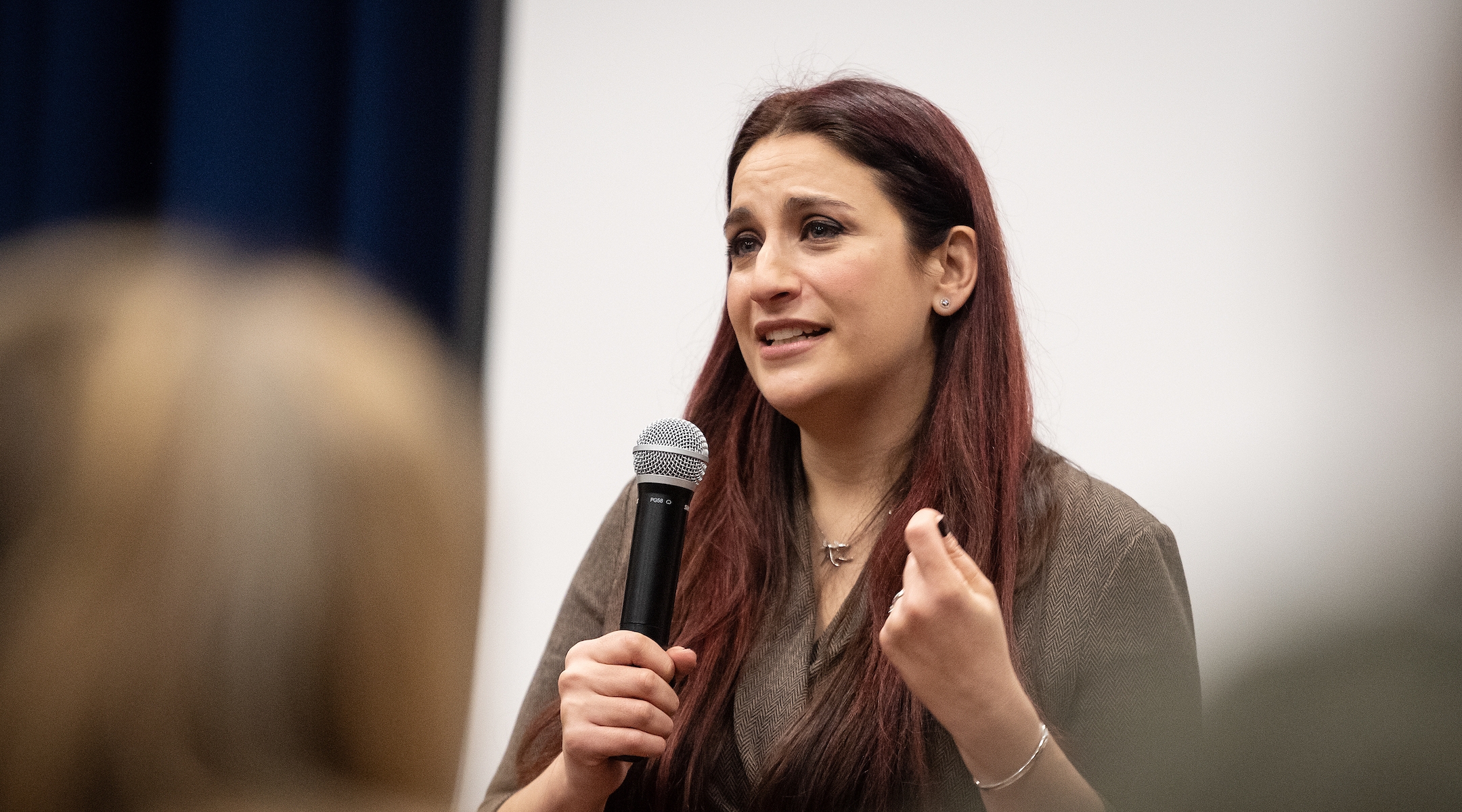
Luciana Berger speaks to supporters during an election campaign event in Finchley, London, Dec. 1, 2019. (Leon Neal/Getty Images)
As Britain’s Labour Party spiraled into an anti-Semitism controversy after Jeremy Corbyn took over as party leader in 2015, Luciana Berger became one of British Jewry’s most visible and persistent champions.
Berger, 38, wasn’t afraid to scorn Corbyn or his supporters and talked publicly about how she was attacked with anti-Semitic abuse for speaking out on the issue — even while she was 8 months pregnant with her second child. Other Jewish politicians and celebrities followed her lead in criticizing Labour, which was once the political home for most of the U.K.’s hundreds of thousands of Jews.
“I had too many threats — I’d be stabbed, raped, have acid thrown on me,” Berger told The Times of London.
After a failed attempt to start a new party with other unhappy Labour members, Berger left the party in 2019 and risked her career by running on the centrist Liberal Democrat ticket in a hard-to-win Conservative district. She lost in the 2019 election that saw Prime Minister Boris Johnson consolidate his power, but that didn’t diminish her legacy of defending her nation’s Jewish community.
–Cnaan Liphshiz
Debra Katz
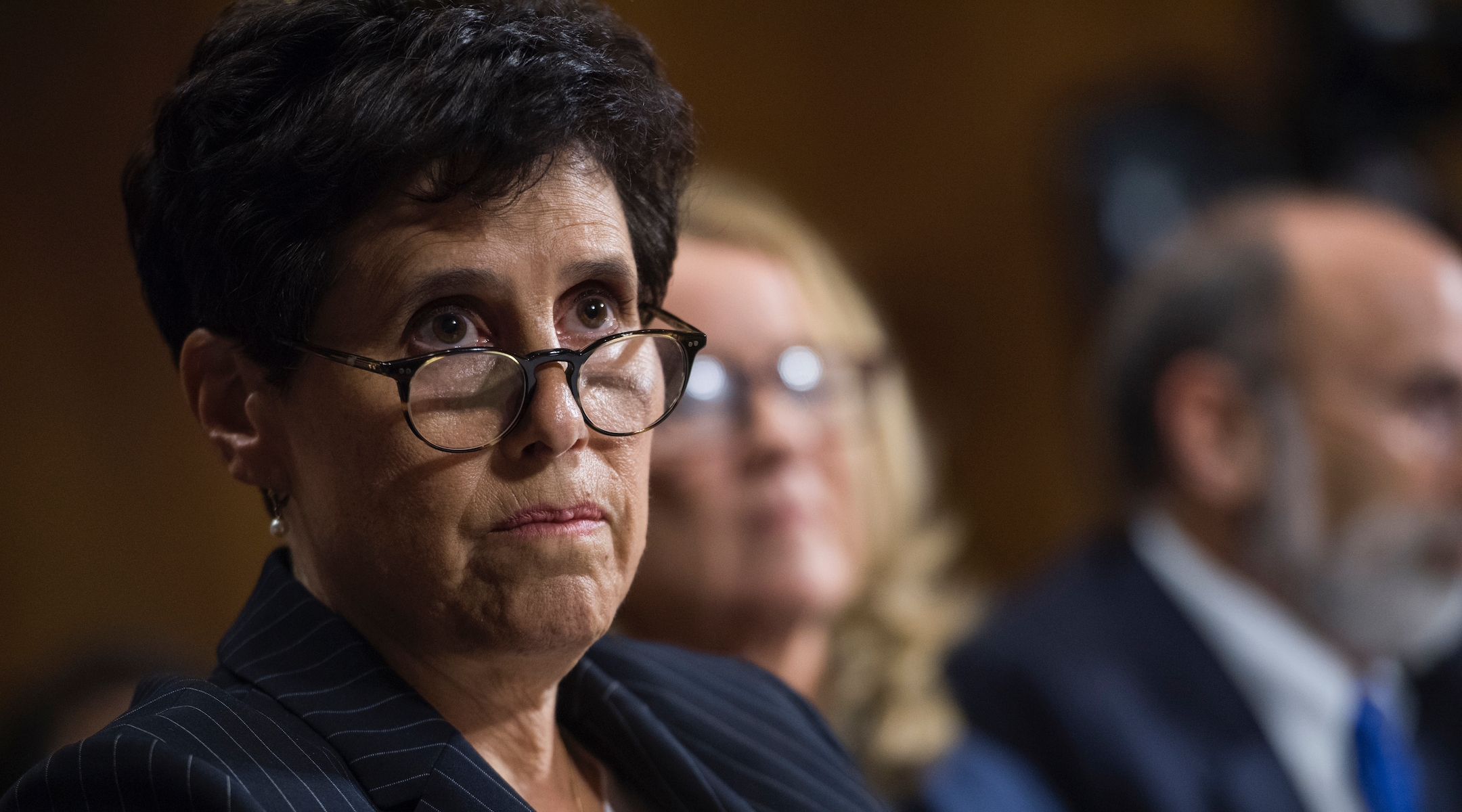
Debra Katz watches as Christine Blasey Ford testifies to the Senate Judiciary Committee, Sept. 27, 2018. (Tom Williams/CQ Roll Call/Pool/Getty Images)
Many figures have contributed to the success of the #MeToo movement, from reporters like Megan Twohey and Jodi Kantor to celebrities who have used their platforms to speak out, like Reese Witherspoon. But few have had as big of an impact behind the scenes as Debra Katz.
Katz always knew she wanted to fight for the underdog, but it was a fellowship after her graduation from law school that ended up shaping her career. The fellowship allowed her to work on the landmark Meritor Savings Bank v. Vinson case, in which the Supreme Court recognized sexual harassment as a category of workplace discrimination.
Katz, 61, has now become one of the top #MeToo attorneys of the modern era, representing a range of people from a former Harvey Weinstein employee to the accusers of celebrity chef Mike Isabella and Jewish mega-donor Michael Steinhardt.
But her most visible case was the one that involved Christine Blasey Ford, the woman who accused Supreme Court Justice Brett Kavanaugh of assaulting her when they were teenagers. Katz sat next to Blasey Ford as she delivered tearful testimony in front of the Senate Judiciary Committee in September 2018 that shook the nation.
–Josefin Dolsten
Julian Edelman
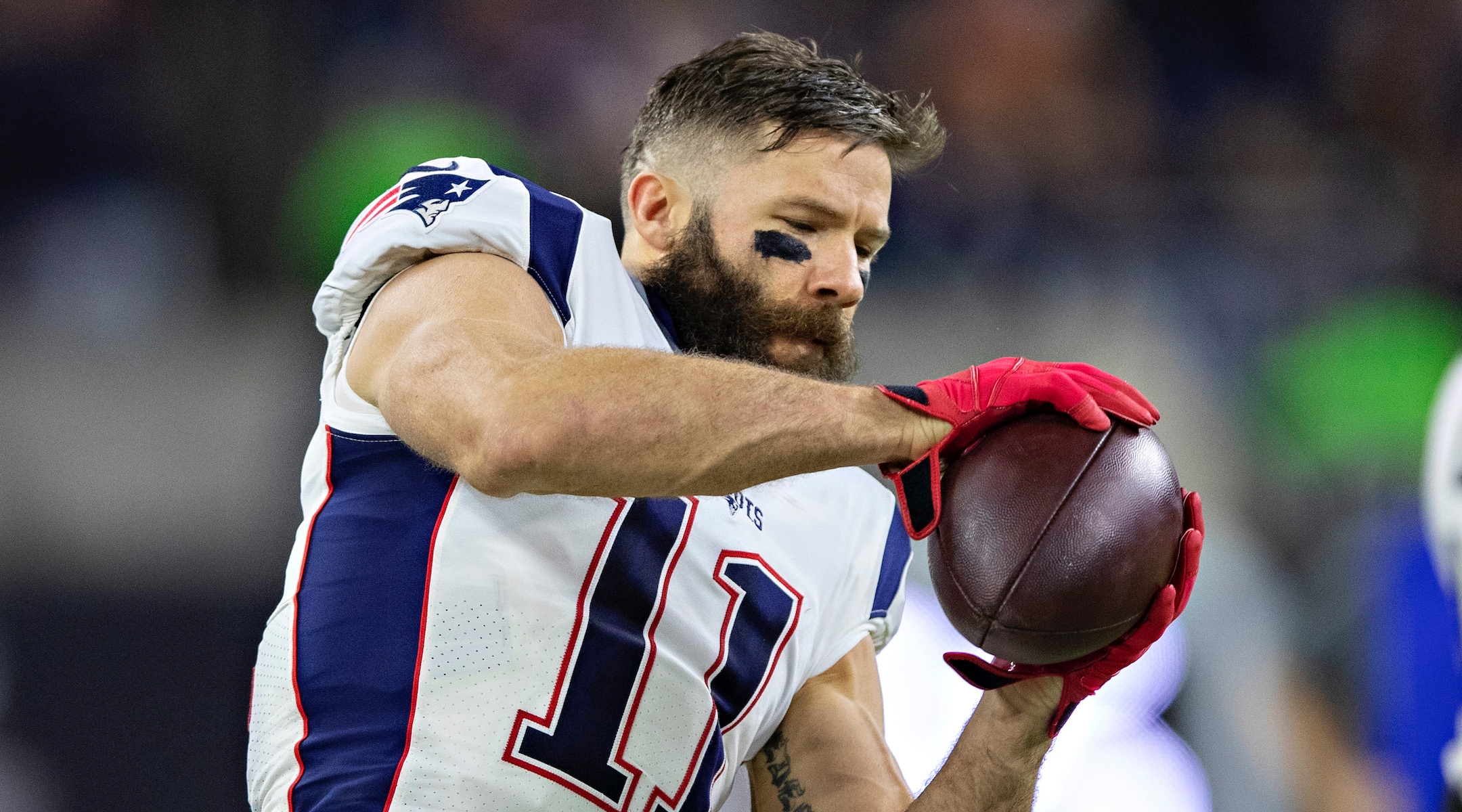
Julian Edelman warms up before a game against the Houston Texans at NRG Stadium in Houston, Dec. 1, 2019. (Wesley Hitt/Getty Images)
At the start of this year, JTA asked this question in a headline: Is Julian Edelman the best Jewish football player ever? We may not be able to answer that one definitively, but the New England Patriots wide receiver is unquestionably the best Jewish pro ballplayer of the decade (in football or any other sport) and the one who is least shy about displaying his Jewish pride.
As he ascended from a last round draft pick in 2009 to top target for Tom Brady (arguably the best quarterback ever), the Patriots have dominated the NFL. He has been especially prominent in the postseason, playing on two Super Bowl champion teams (he missed the 2017 title season with an injury) and winning the Most Valuable Player award in the 2019 victory over the Los Angeles Rams.
Edelman, 33, is the son of a Jewish father but was not raised in the religion. However, his Jewish pride has swelled over the years as his game has gained in stature. He has tweeted about Jewish holidays. He went on a Birthright-style trip to Israel. He wrote a children’s book that references modern-day Zionism founder Theodor Herzl.
In his latest display, Edelman debuted custom cleats featuring a Star of David and the logo of the Israel Baseball Association as part of the NFL’s fourth “My Cause, My Cleats’’ campaign. The previous year, he donned special cleats in Pittsburgh to honor the victims of the synagogue shooting there in a game against the Steelers.
–Marc Brodsky
Naomi Wadler
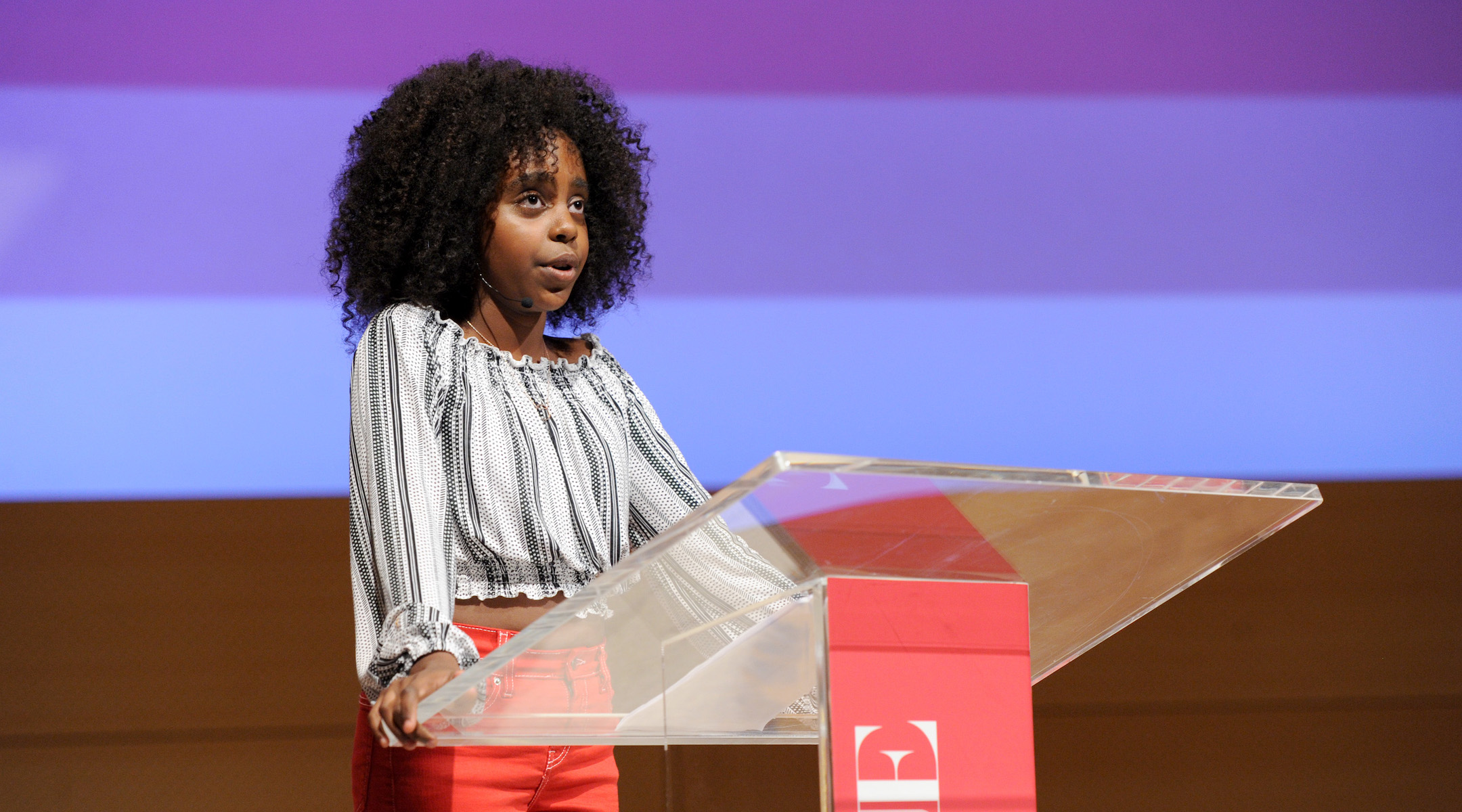
Naomi Wadler speaks at the Teen Vogue summit in New York City, June 1, 2018. (Craig Barritt/Getty Images for Teen Vogue)
A fifth-grader’s eloquent and passionate address at the 2018 March for Our Lives event captured the attention not only of the crowd at the gun reform rally but that of millions of people watching from afar. That person, who is now just 12 years old, is Naomi Wadler.
Together with a classmate, Wadler planned an 18-minute walkout at her elementary school in Alexandria, Virginia. While most schools were doing 17-minute walkouts to represent the 17 victims of the 2018 Parkland shooting, Wadler and her classmate added one more to represent Courtlin Arrington, a 17-year-old girl who had been killed in her Alabama high school classroom days earlier. Wadler wanted to make the point that black victims of gun violence like Arrington are often not the subject of the same media attention as white victims.
“I represent the African-American women who are victims of violence, who are simply statistics instead of vibrant, beautiful girls who are full of potential,” Wadler, who is African-American and Jewish, said in her speech.
Wadler’s speech made her a media darling. She was featured with Gloria Steinem in a spread in Vanity Fair, appeared on “The Ellen DeGeneres Show” and the Smithsonian even asked to add the scarf she wore during her speech to its collection.
Her rise to fame helped break stereotypes of what Jews look like. In interviews, she spoke about having experienced discrimination and bullying both for her race and religion, including being told she could not be Jewish because she is black.
–Josefin Dolsten
Eric Zemmour
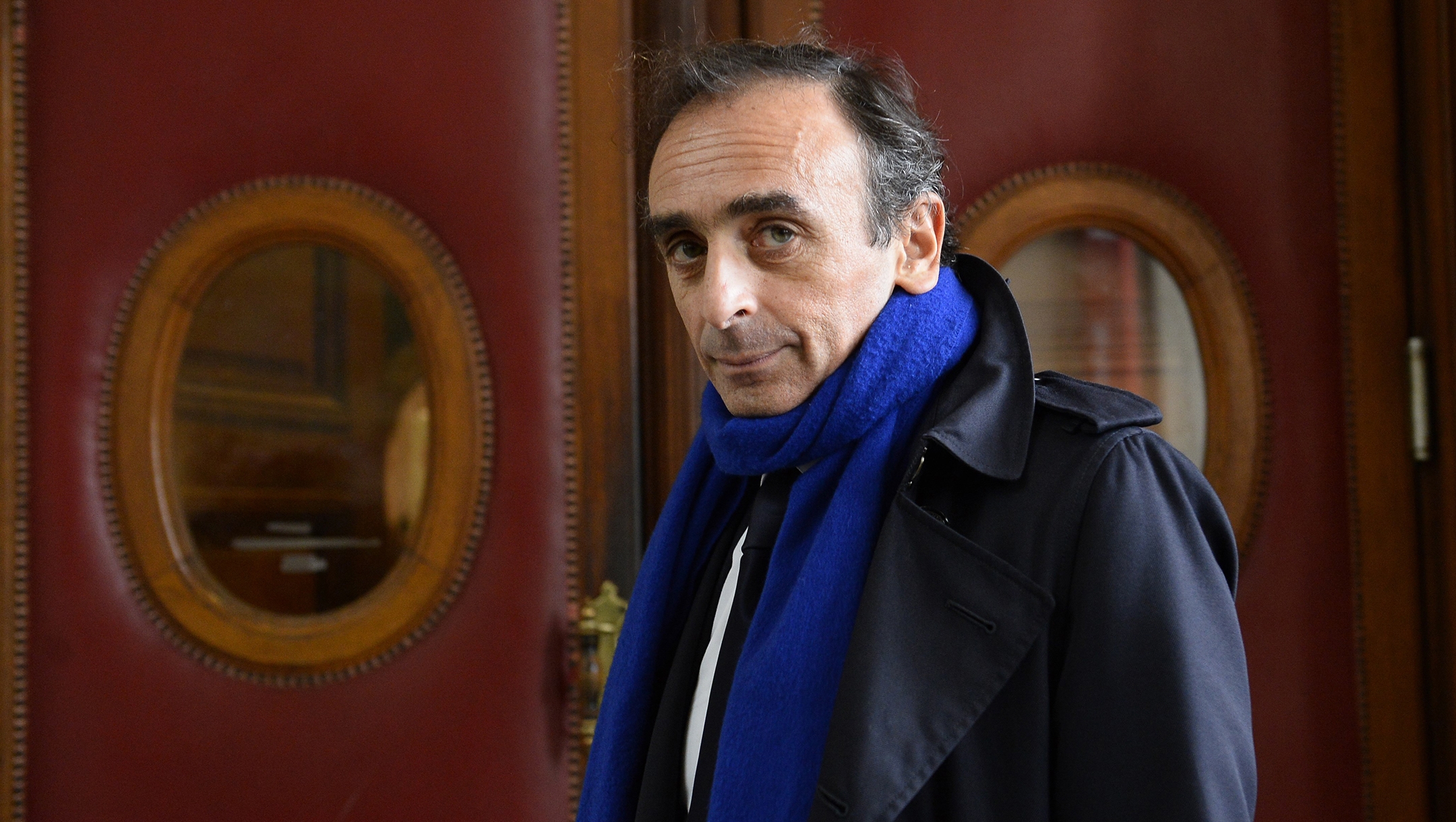
French journalist and writer Eric Zemmour arrives at Paris Criminal Court, where he was prosecuted for incitement to racial hatred, Nov. 6, 2015. (Bertrand Guay/AFP/Getty Images)
Frenchman Eric Zemmour has become one of the most prominent anti-immigration voices in Europe over the past ten years. But on paper, he’s not an obvious fit for a leading role in the debate that has roiled the continent.
For one thing, he’s a journalist who is part of the very left-leaning French intellectual scene. For another, Zemmour’s own Jewish parents immigrated to France from Algeria.
Yet this background, and his ability to leverage it in his arguments, are an integral part of his rising visibility. Zemmour uses it to dismiss allegation of xenophobia. He cites the experience of his family, and French Jewry at large, as a model for other minorities to follow.
His views have placed him under frequent attack in the media, and he has been convicted of hate speech twice. But he has also become a household name with political prospects.
In a 2015 survey, 12 percent of the respondents said they would vote for Zemmour if he ran for president. He has remained noncommittal on the subject.
–Cnaan Liphshiz
Rabbis Jeffrey Myers and Yisroel Goldstein
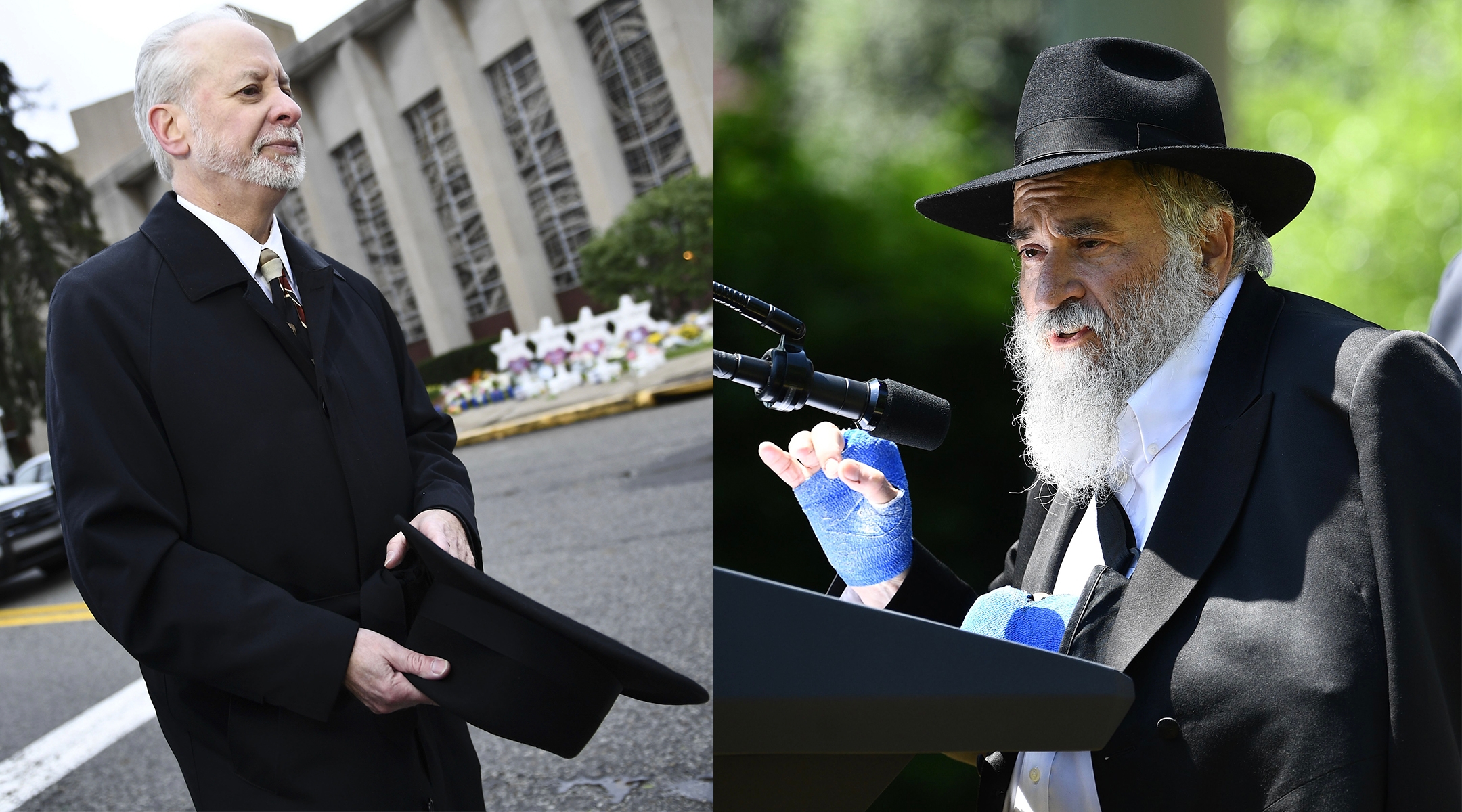
Rabbi Jeffrey Myers, left, outside the Tree of Life building in Pittsburgh, Oct. 29, 2019, and Rabbi Yisroel Goldstein in the Rose Garden of the White House, May 2, 2019. (Getty Images)
In the normal course of affairs, synagogue rabbis toil away in relative obscurity. But two horrific acts of mass violence thrust Rabbis Jeffrey Myers and Yisroel Goldstein into the national spotlight towards the end of the 2010s and, for a time, made them each symbols of resistance to rising anti-Semitic violence.
Goldstein came face to face with the gunman who entered his synagogue in southern California on the last day of the Passover holiday in April 2019. He instinctively raised his arms, and the gunman fired, blowing off the rabbi’s index finger. Then he turned and killed Lori Gilbert-Kaye, who became the attack’s only fatality.
In the months following the attack, Goldstein gave speeches at the White House and the United Nations, and in Brazil and Poland. Seven months after the attack, he retired as leader of the congregation he had founded in Poway, near San Diego, in 1996.
Months earlier, it was Myers who confronted a gunman intent on massacring his congregants. When the shooting at Pittsburgh’s Tree of Life synagogue began on the morning of Oct. 27, 2018, Myers was just minutes into leading Shabbat morning services. When the first shots rang out, he assumed someone had knocked over a coat rack. After leading several people to safety, he returned to the synagogue’s choir loft where he heard the gunman kill seven of his congregants.
In total, 11 people were killed that morning in the deadliest act of ant-Semitic violence in American Jewish history.
Myers would become one of the Pittsburgh Jewish community’s chief spokesmen as the national press descended on the city. “I’m a victim, I’m a survivor, I’m a mourner,” he said at a memorial service two days after the shooting. At a service to mark 30 days, Myers chanted a Hebrew memorial prayer. A year later, the pain of that day had scarcely faded.
“I live with Oct. 27 every minute of every hour of every day, and I will for the rest of my life,” he said.
–Ben Harris
JTA has documented Jewish history in real-time for over a century. Keep our journalism strong by joining us in supporting independent, award-winning reporting.
